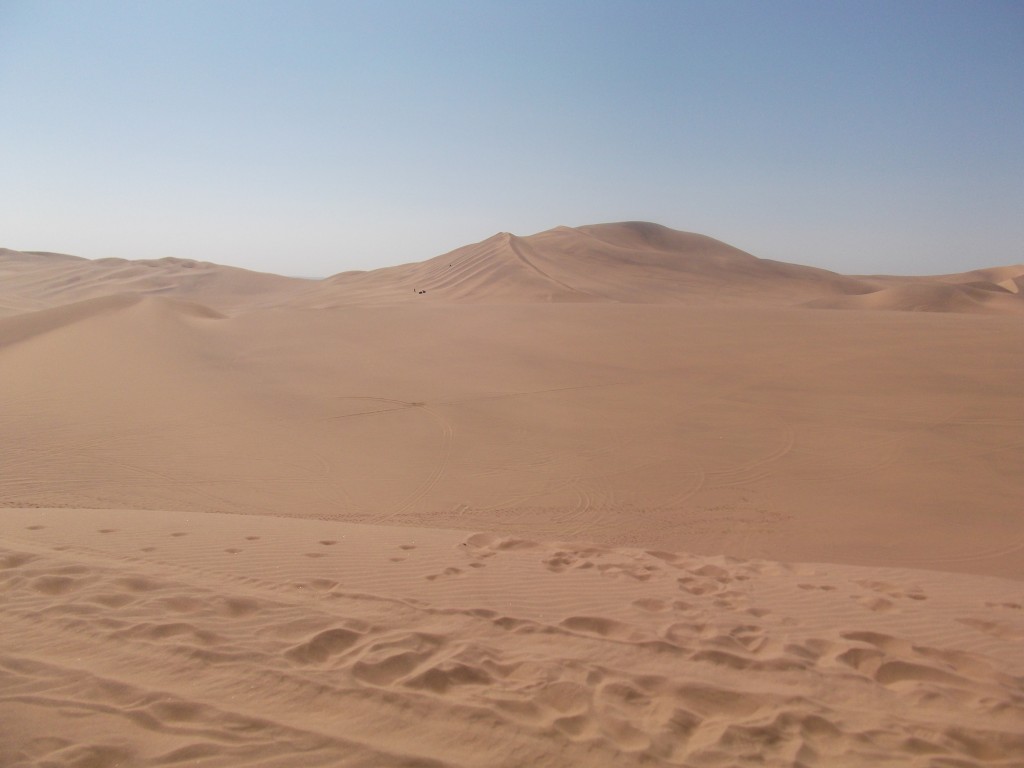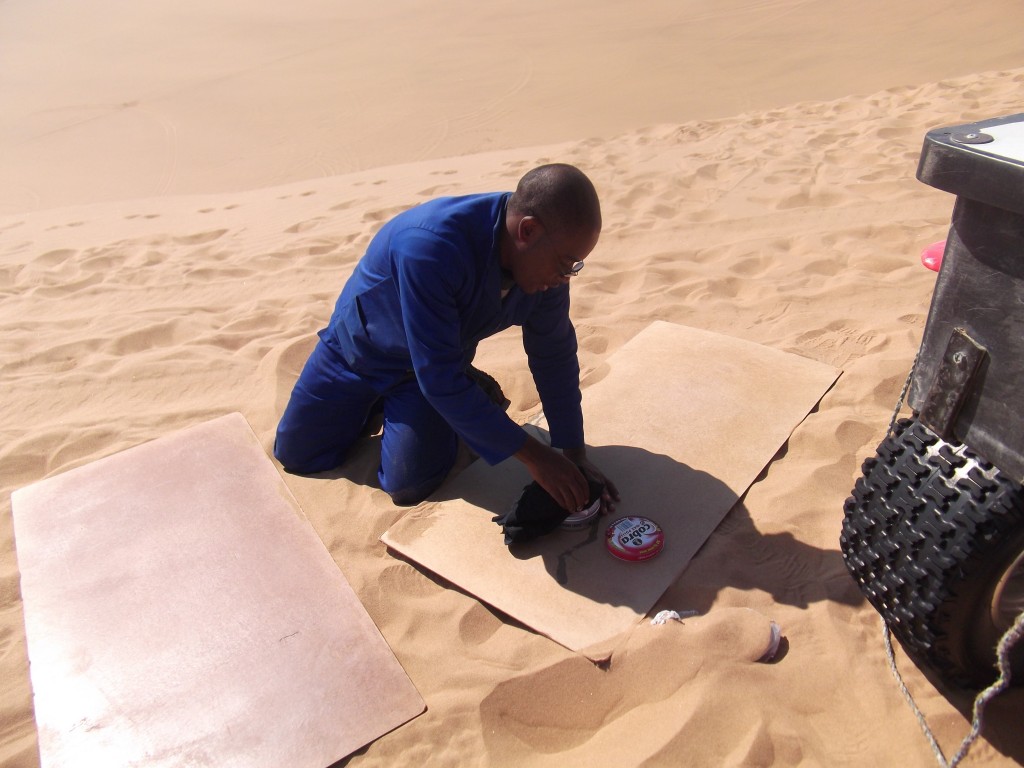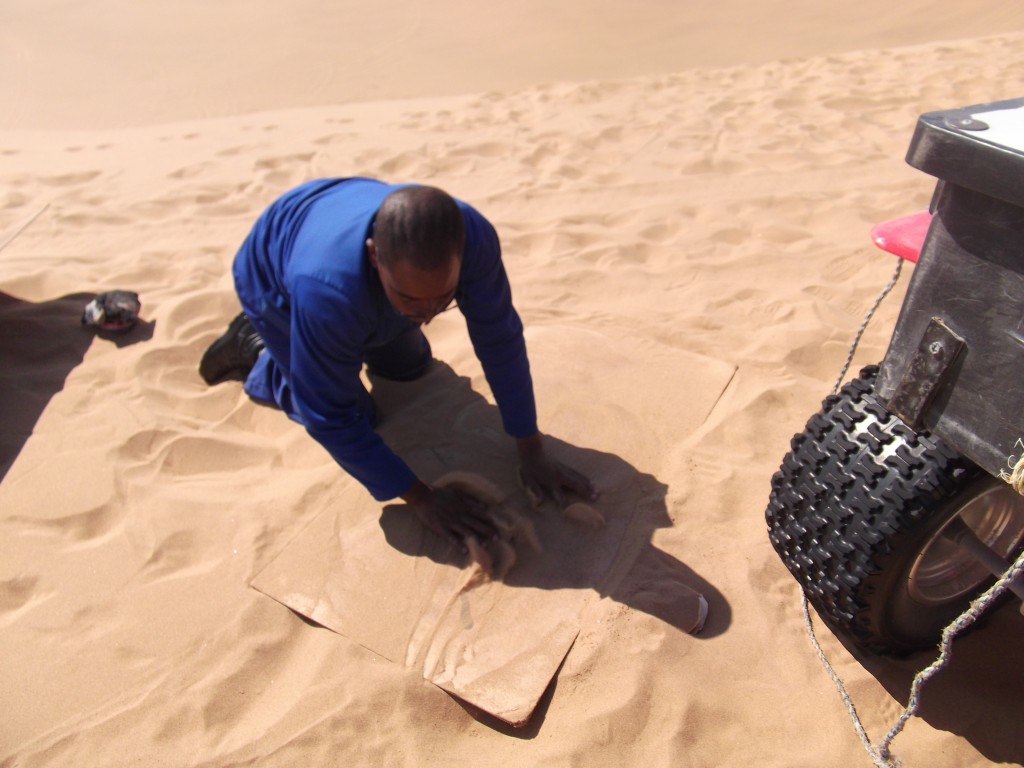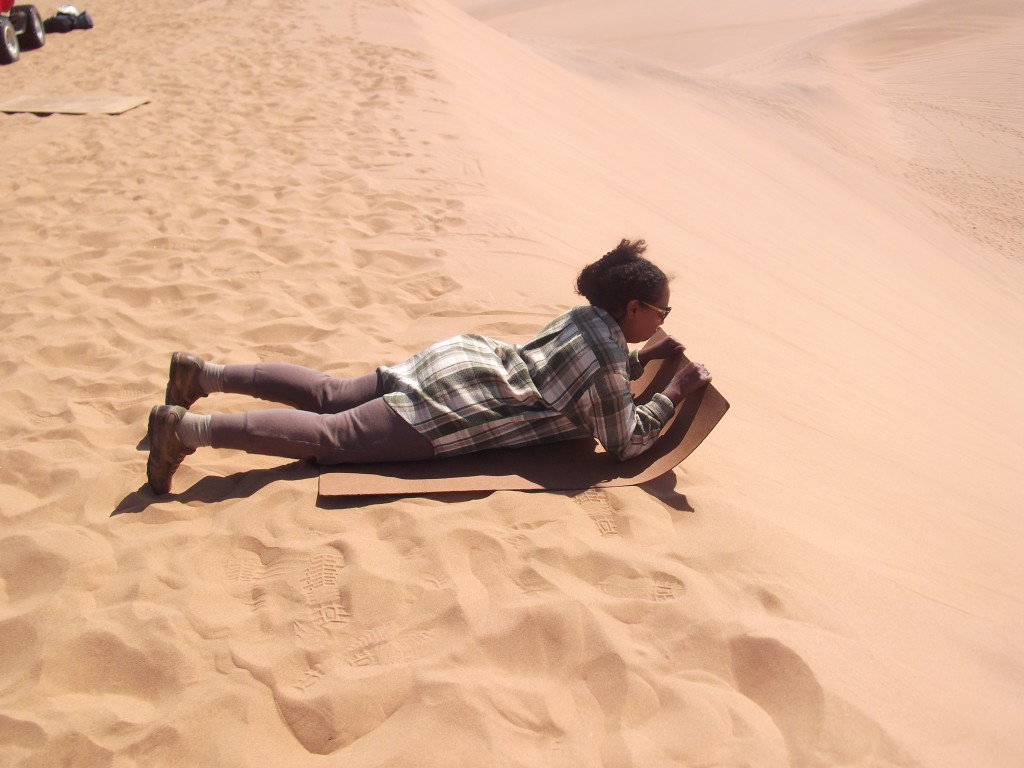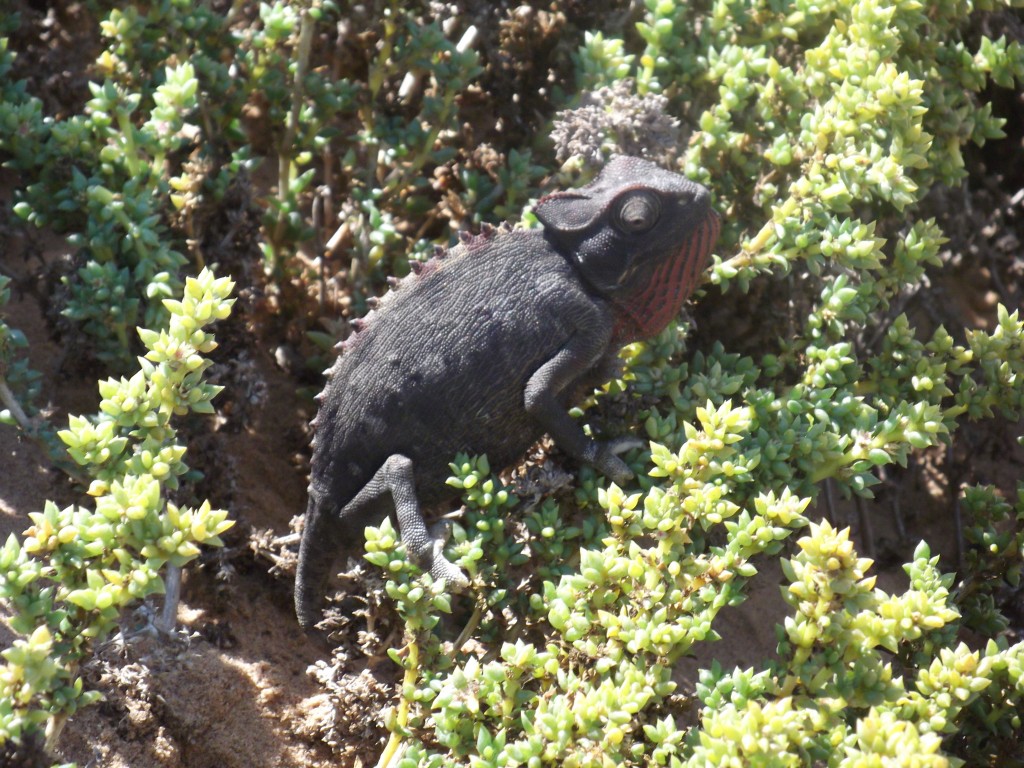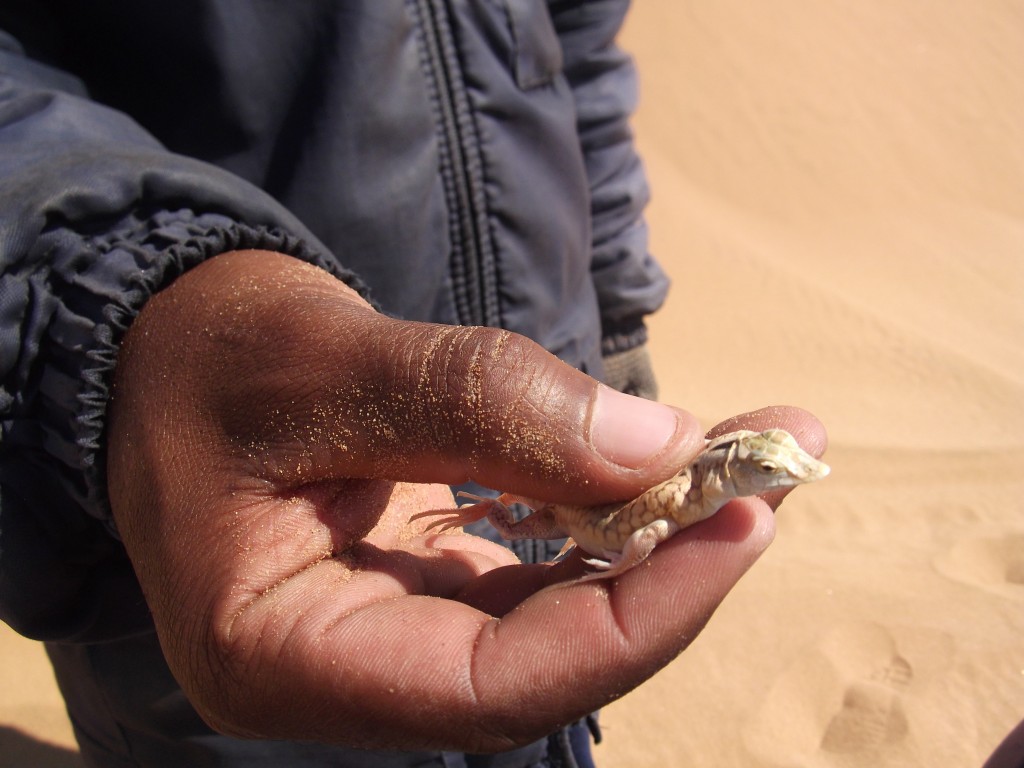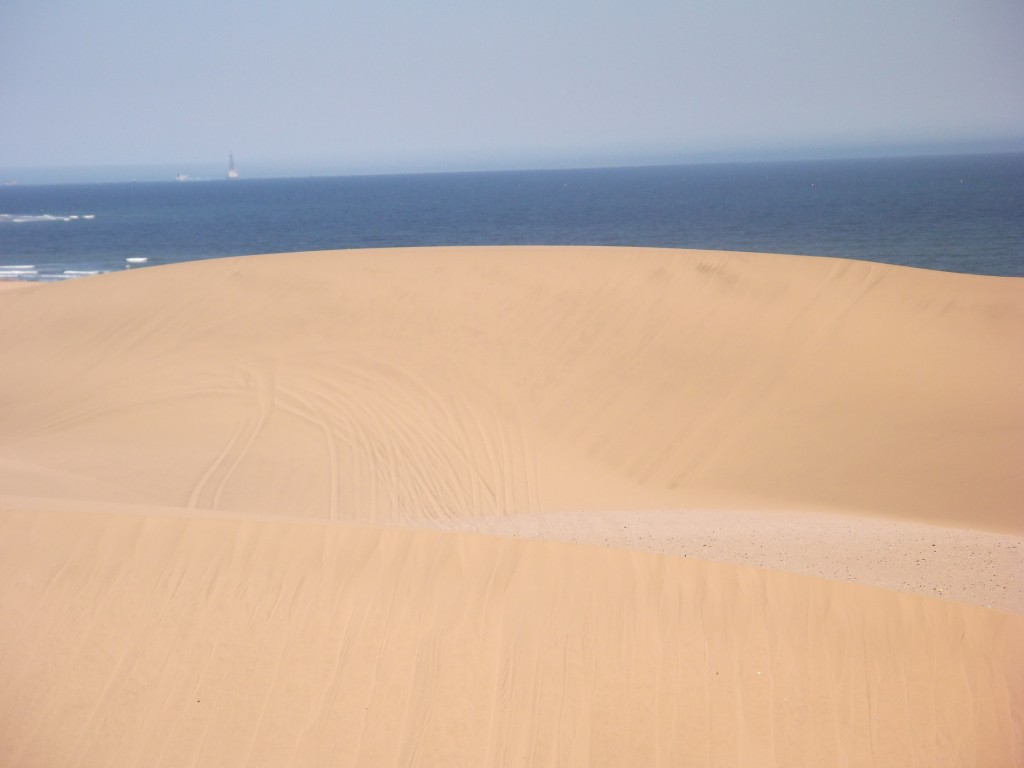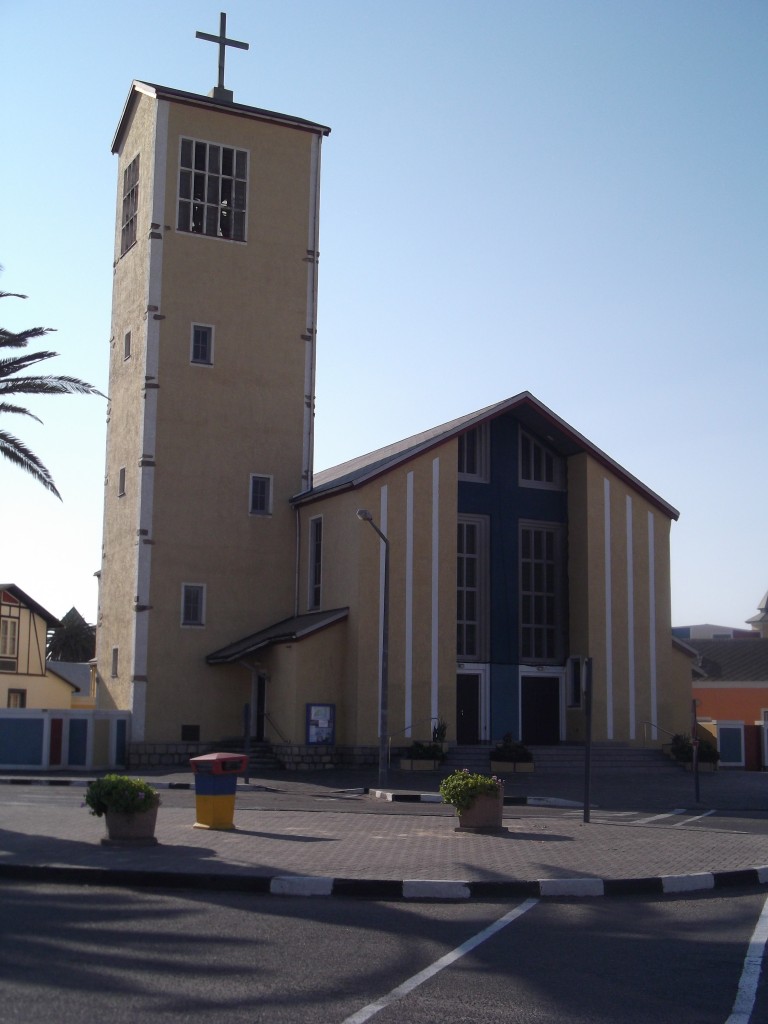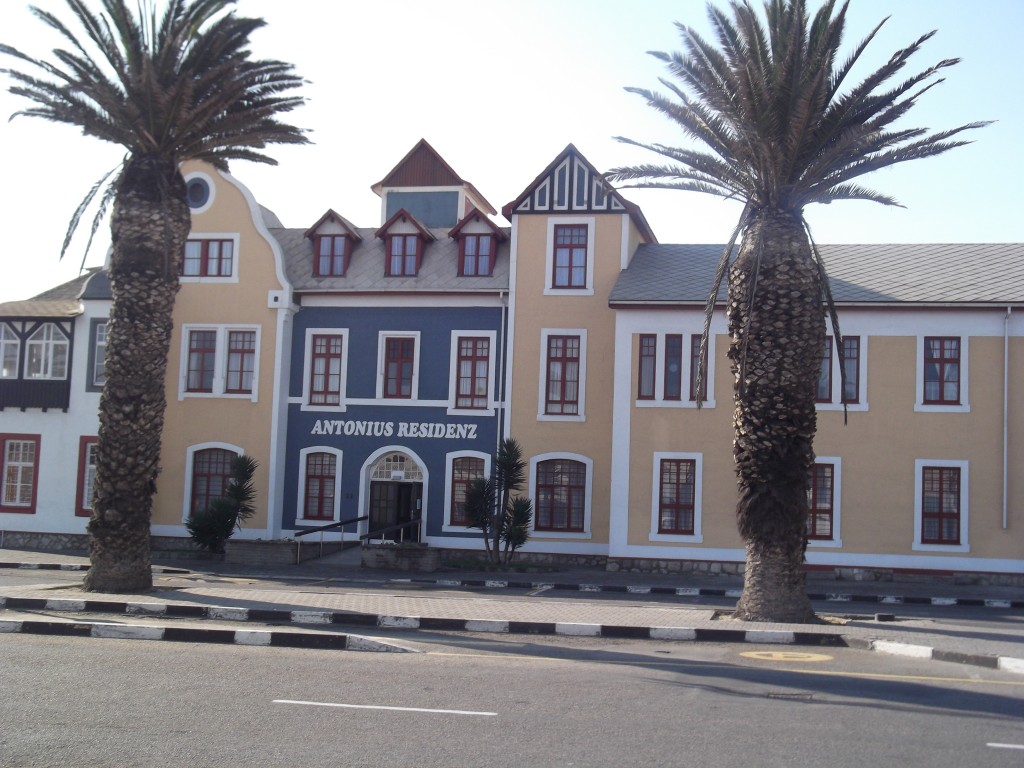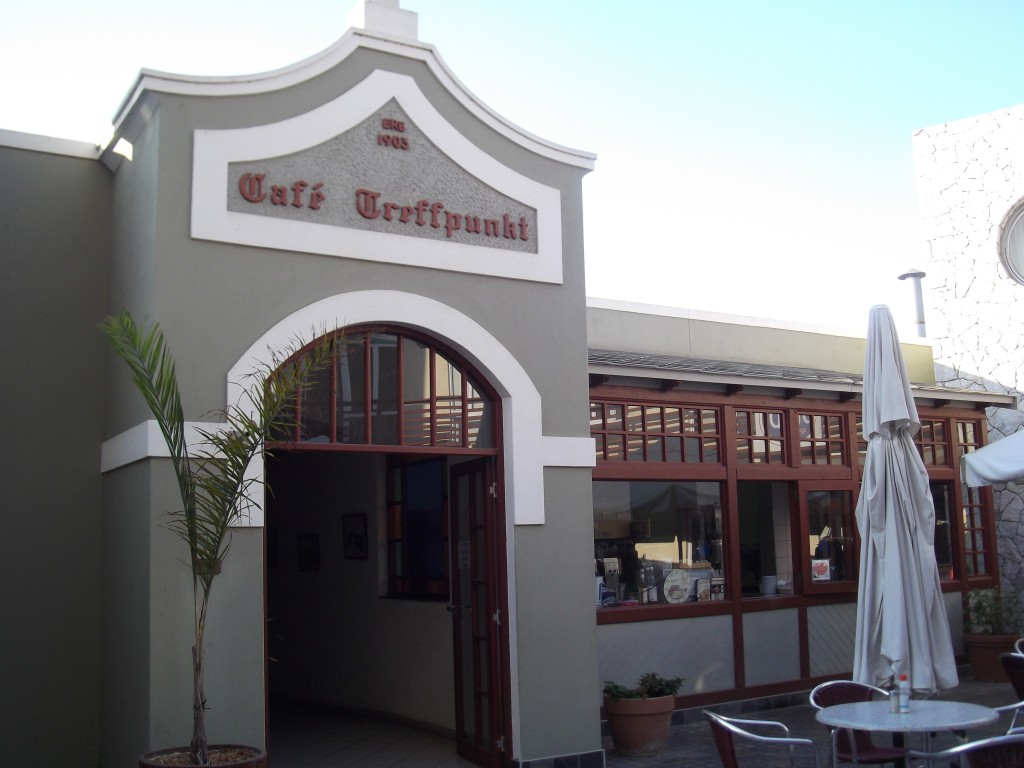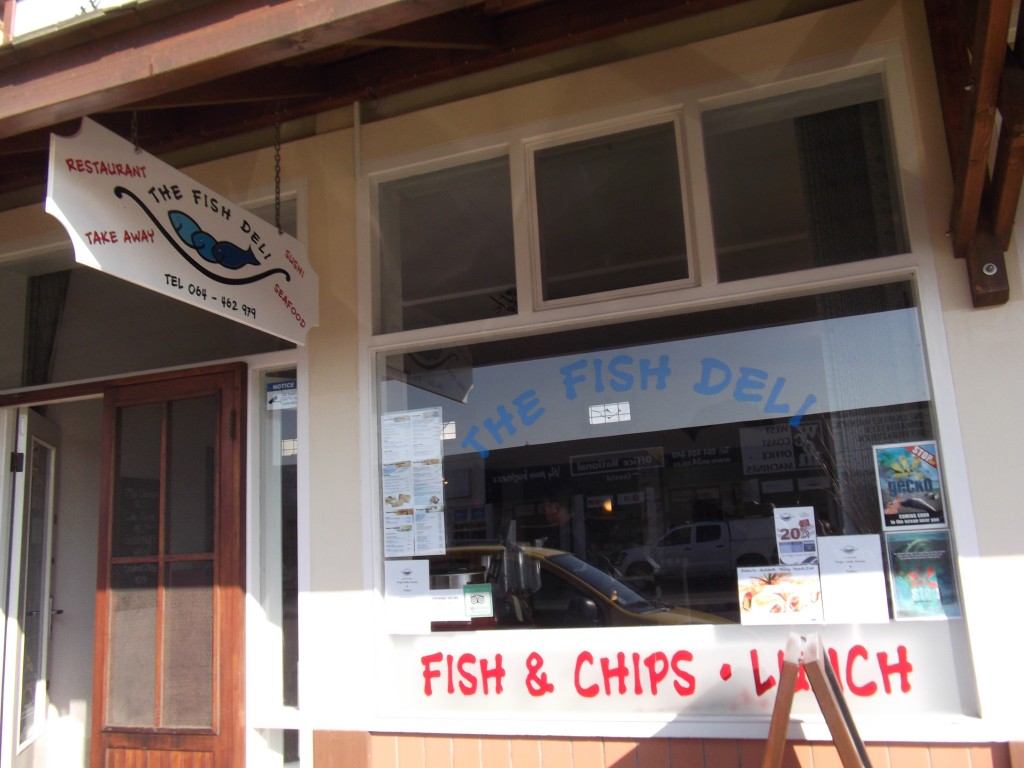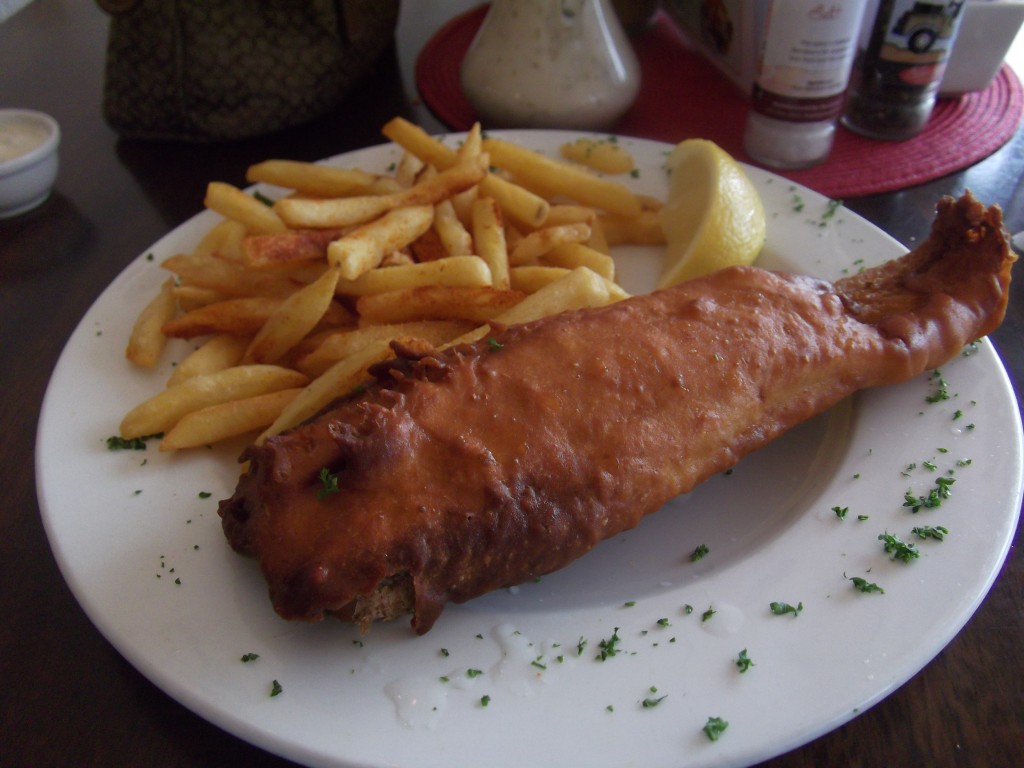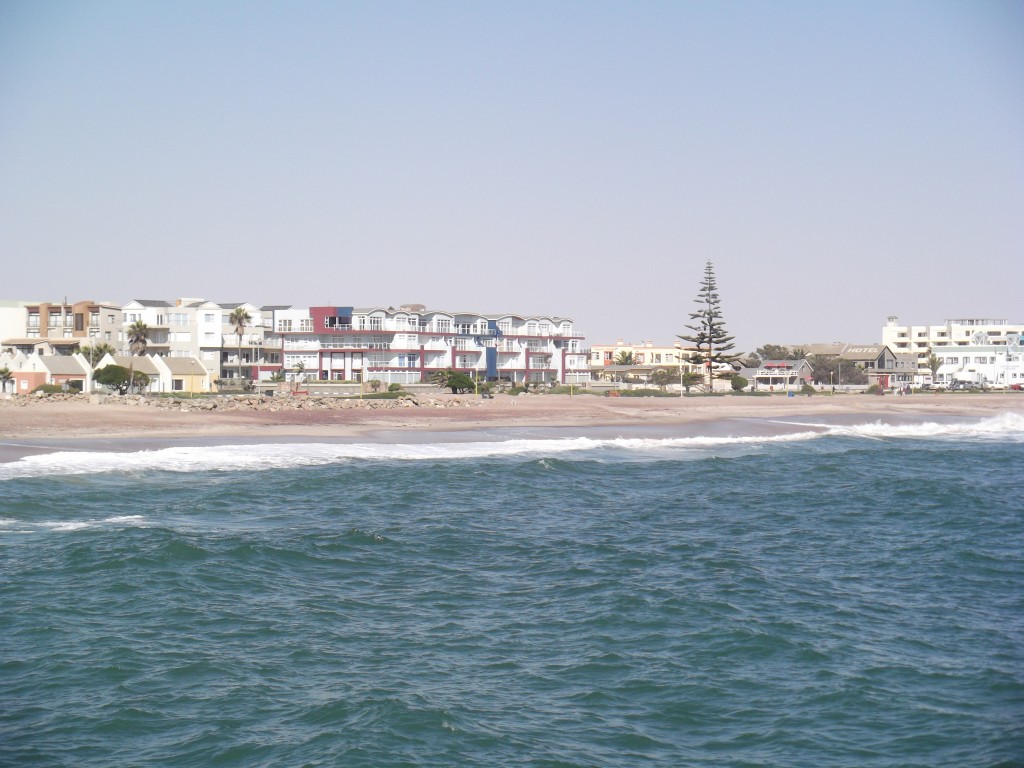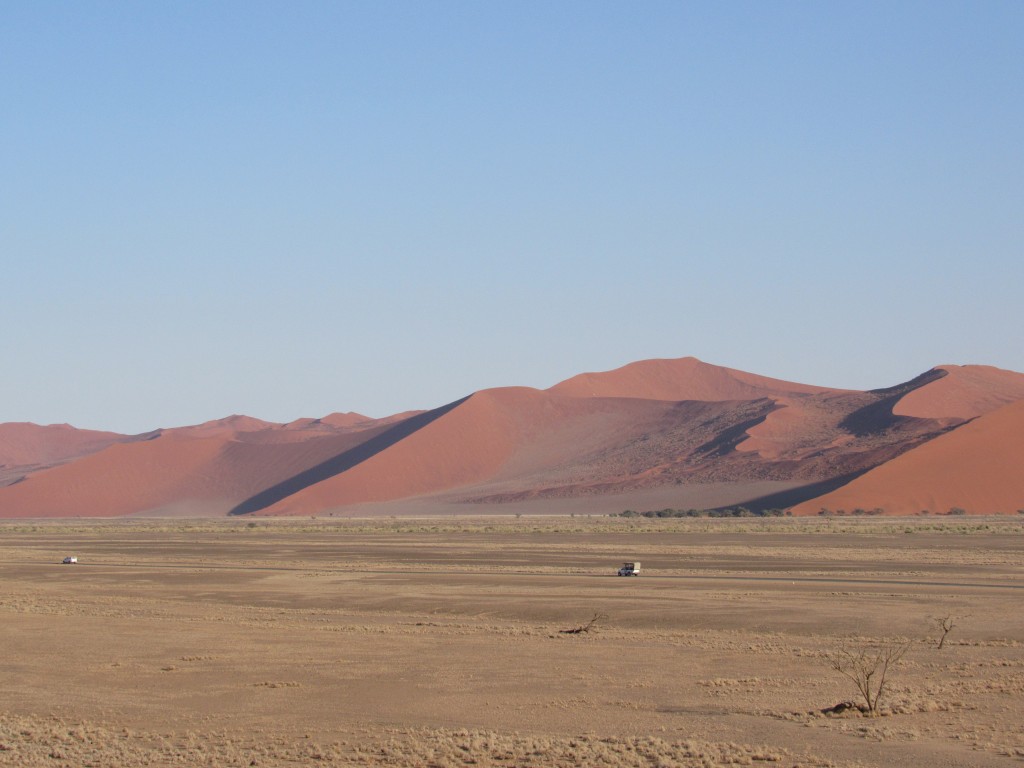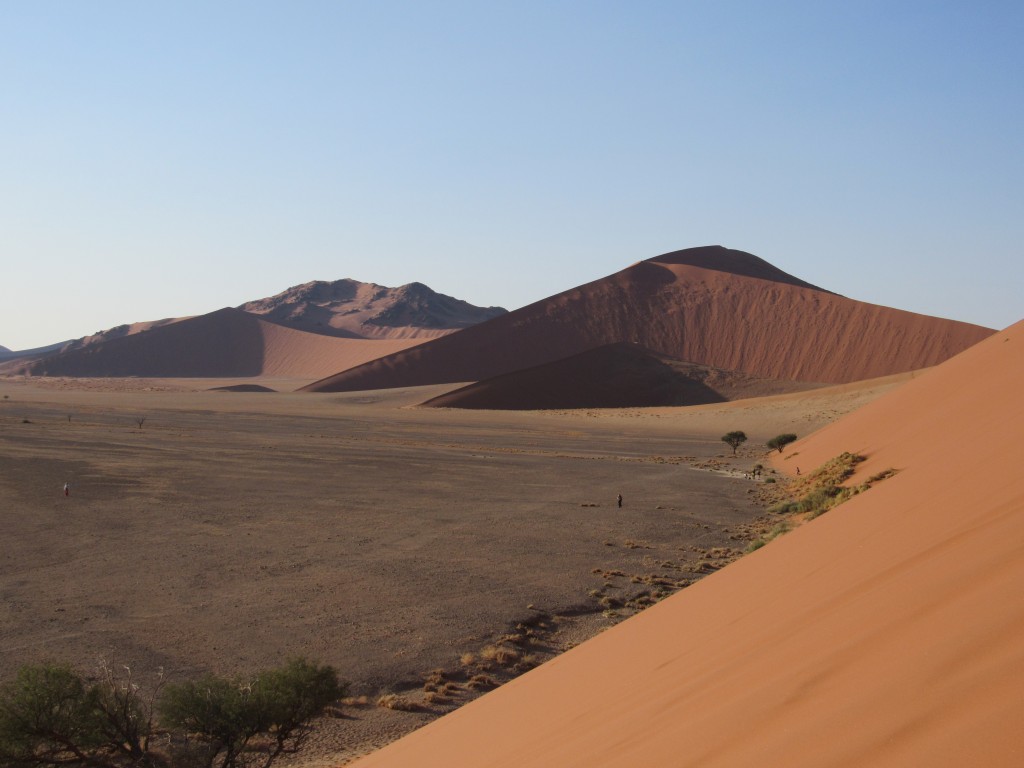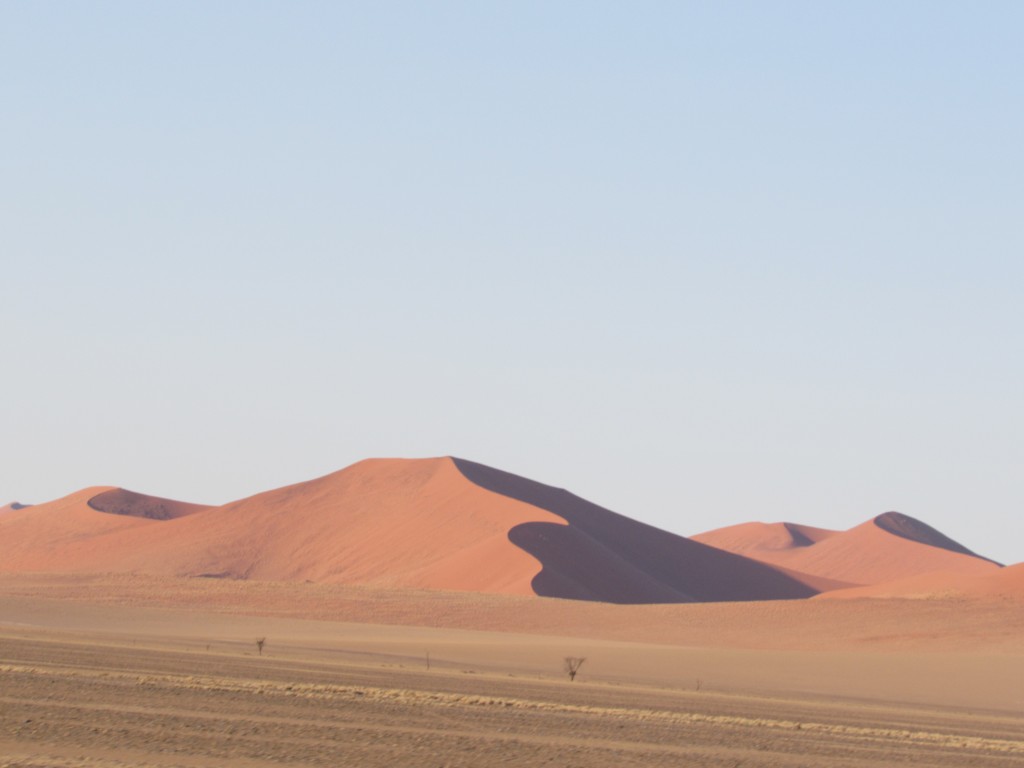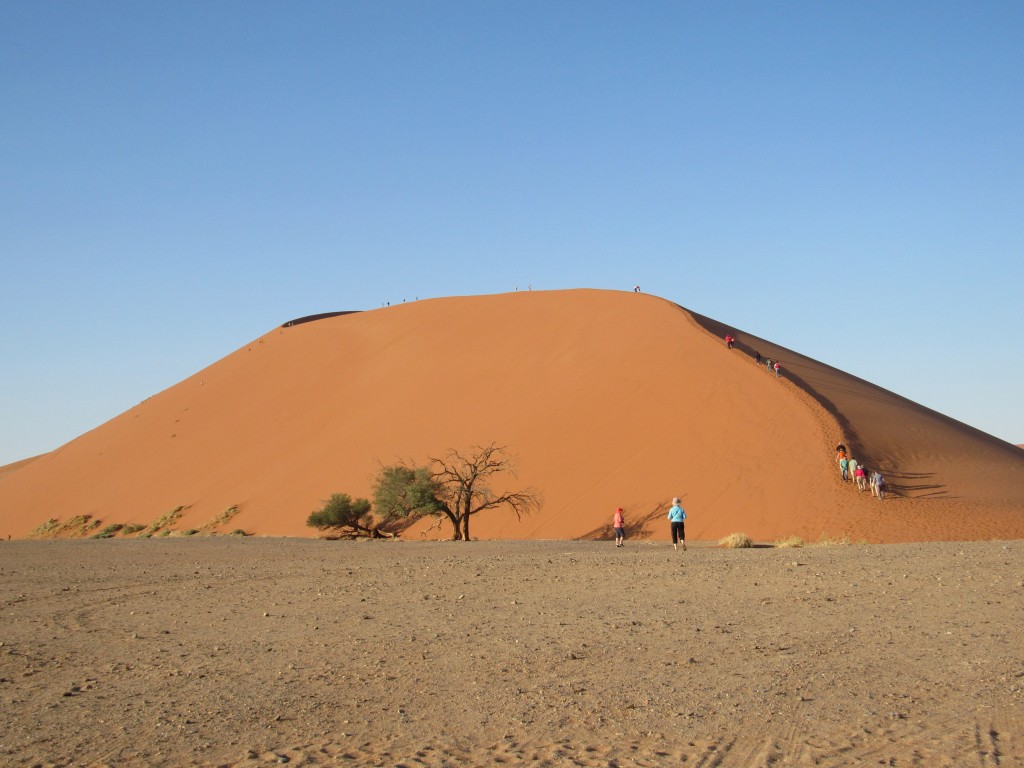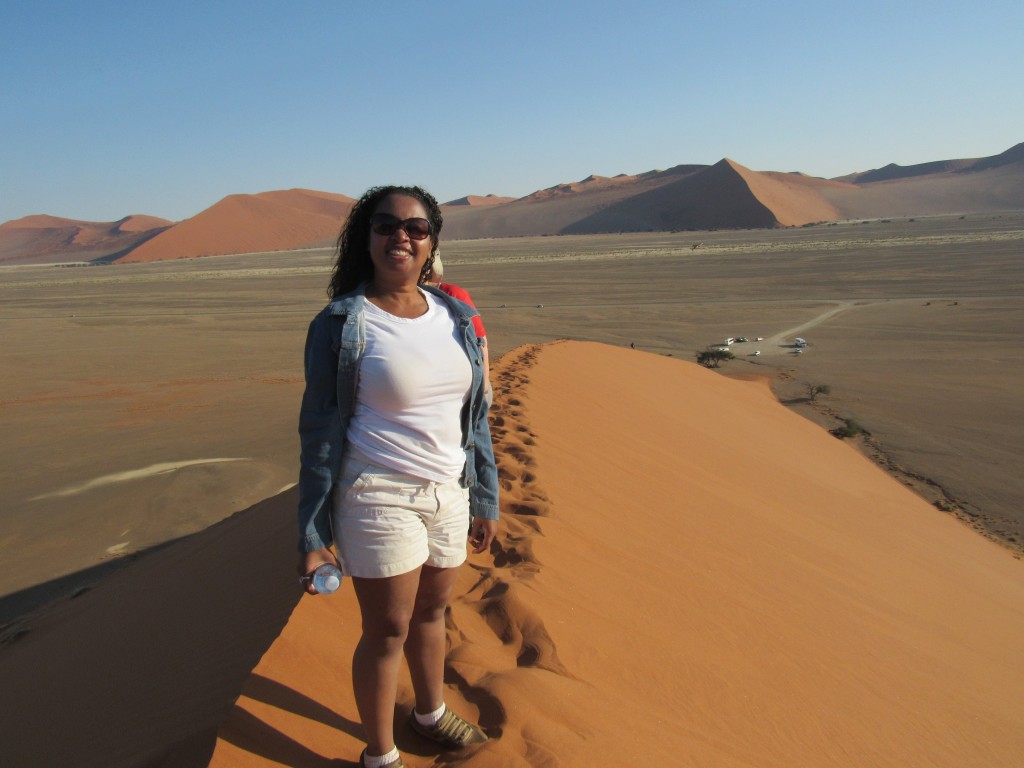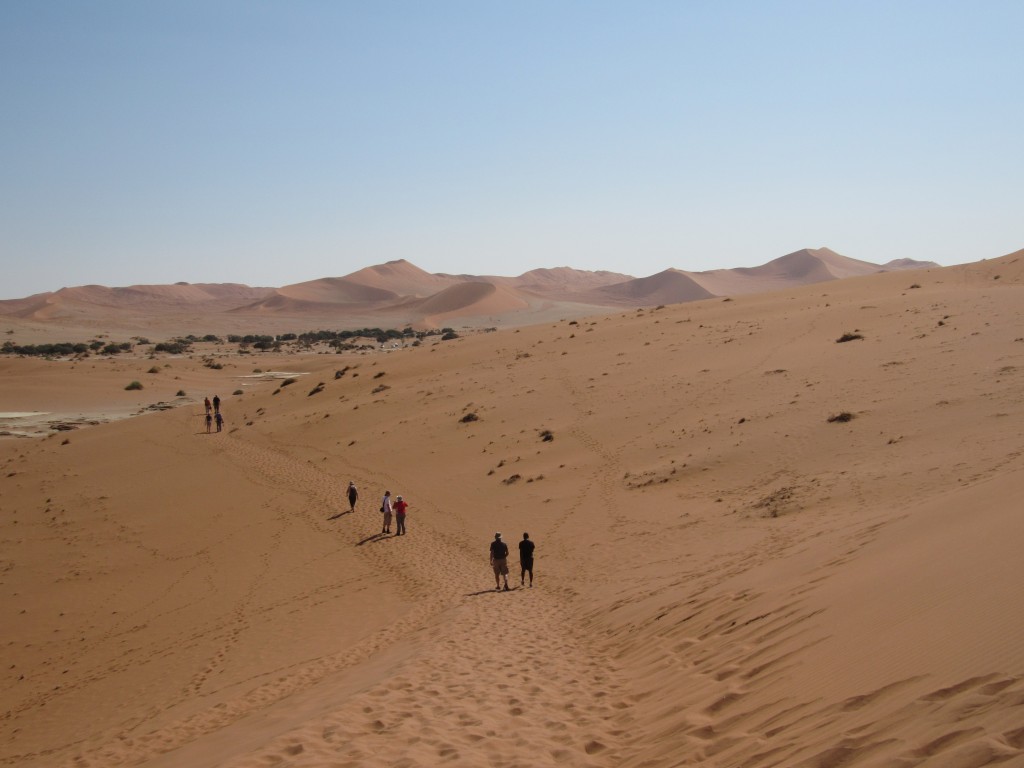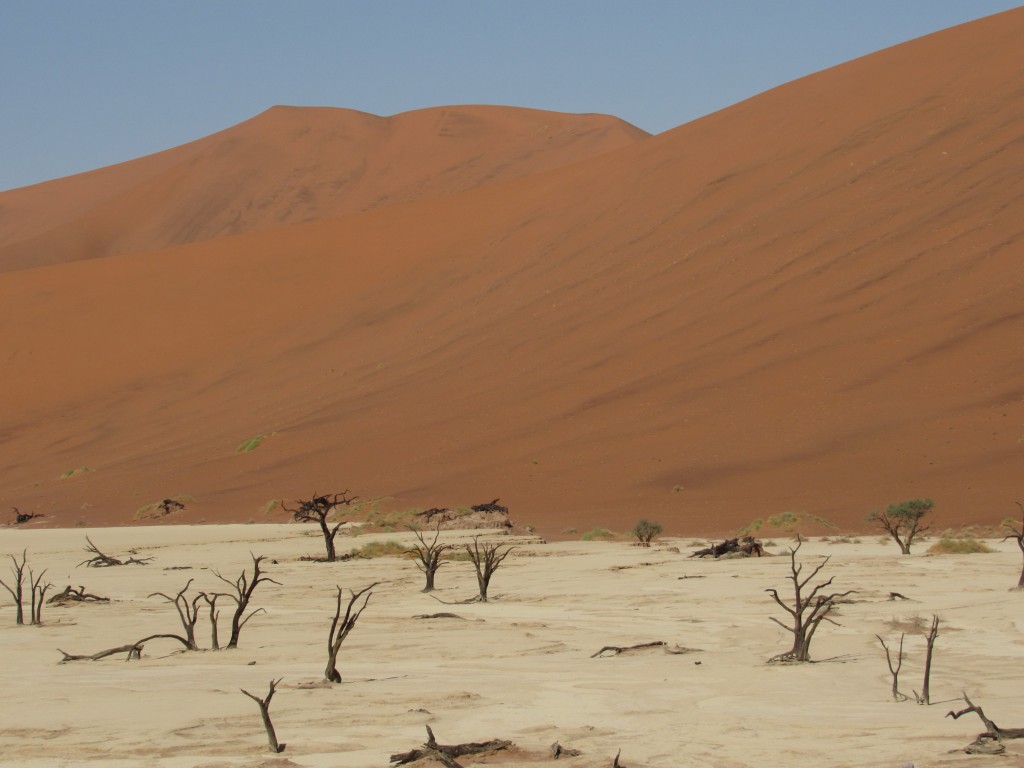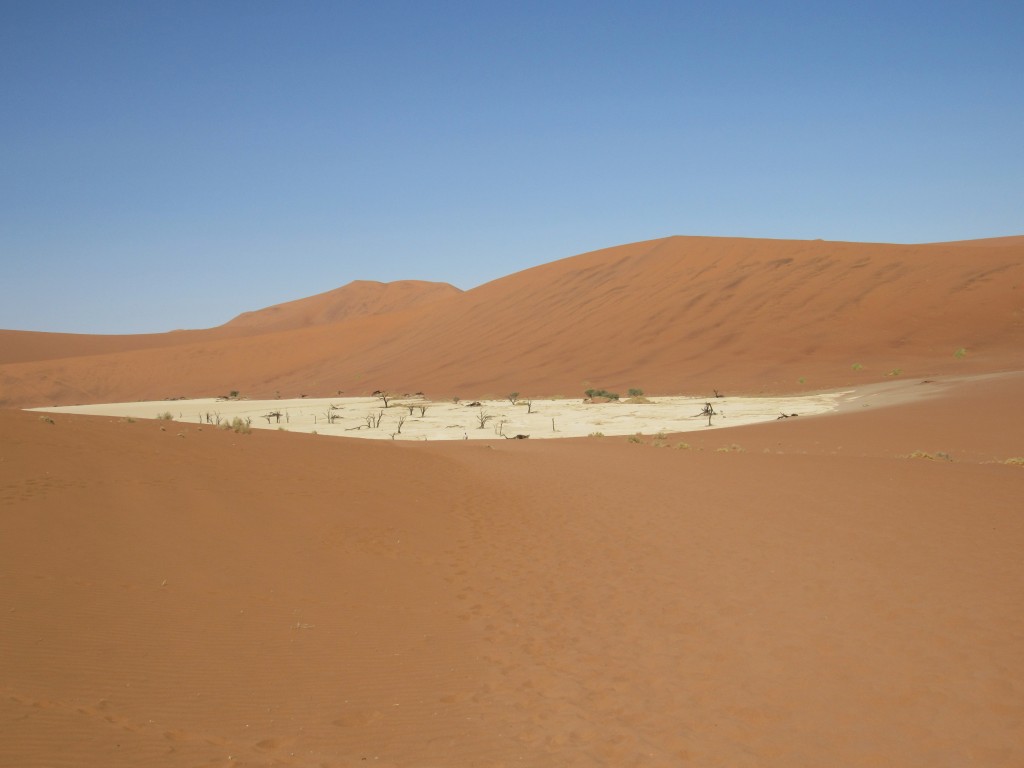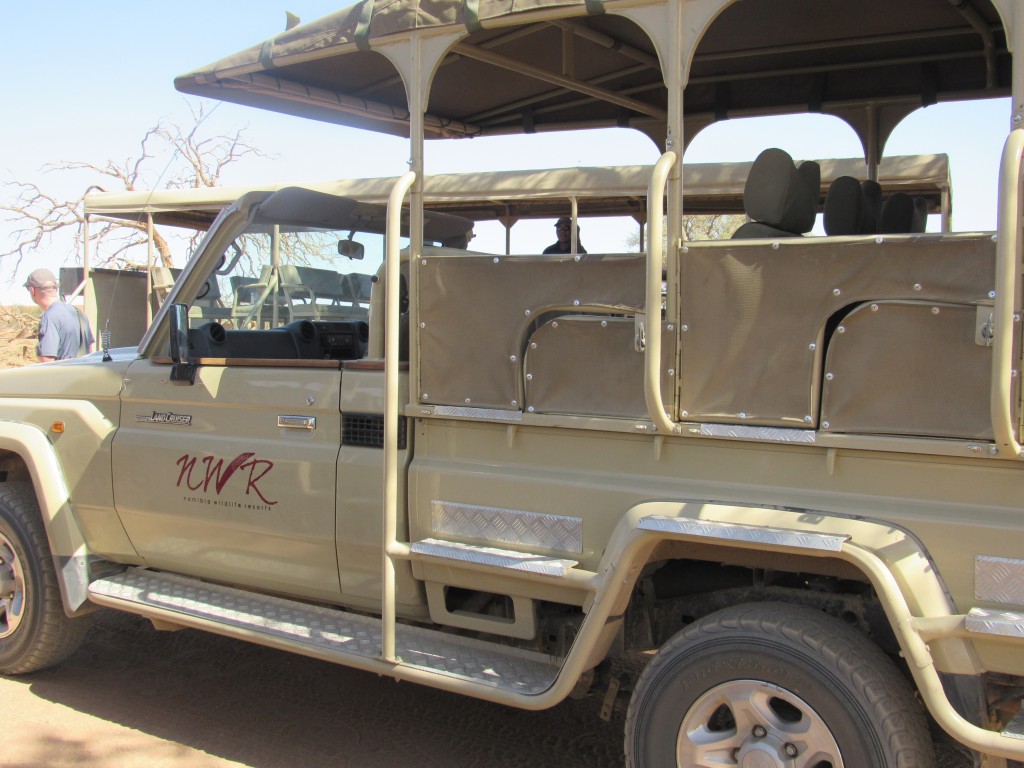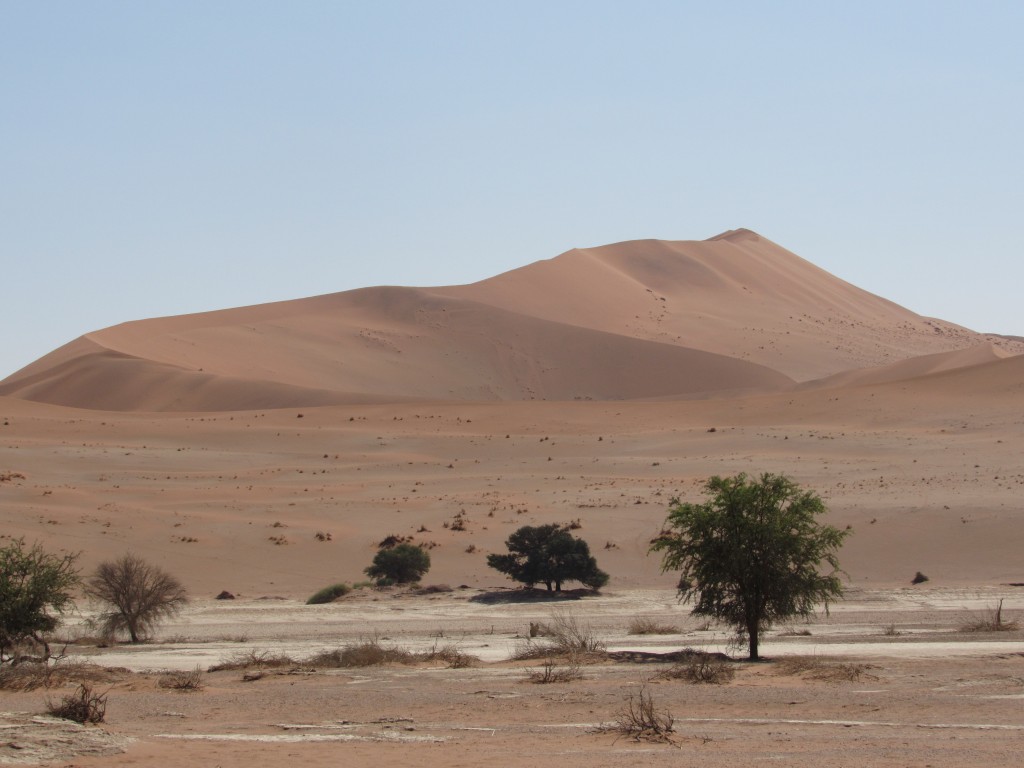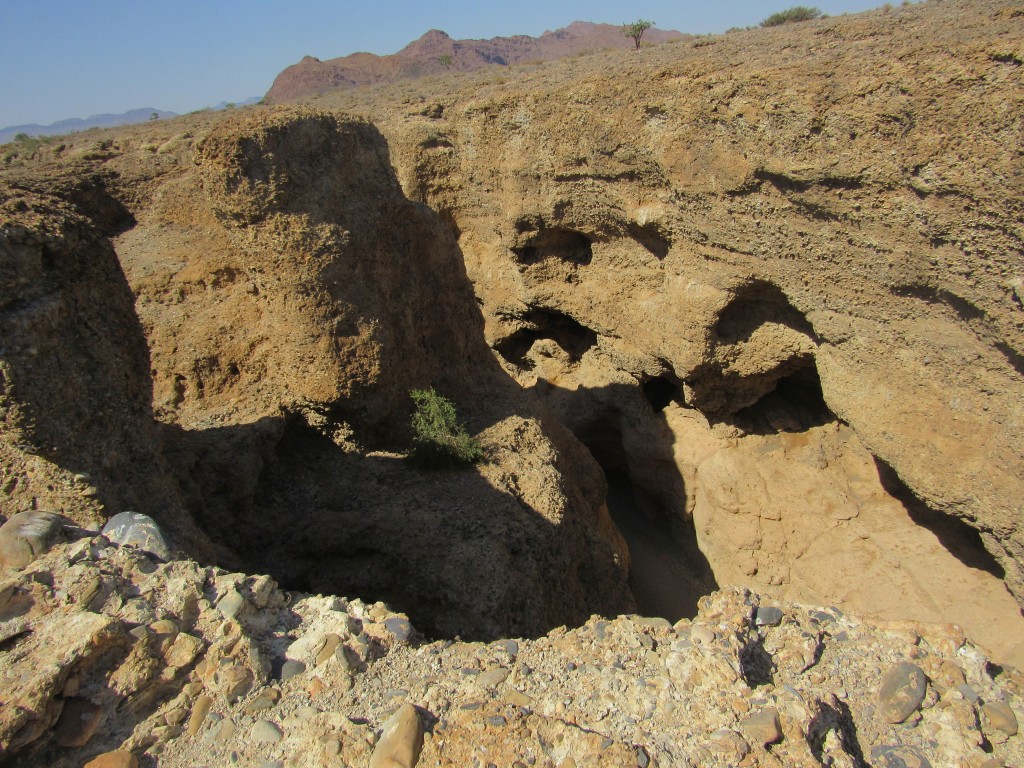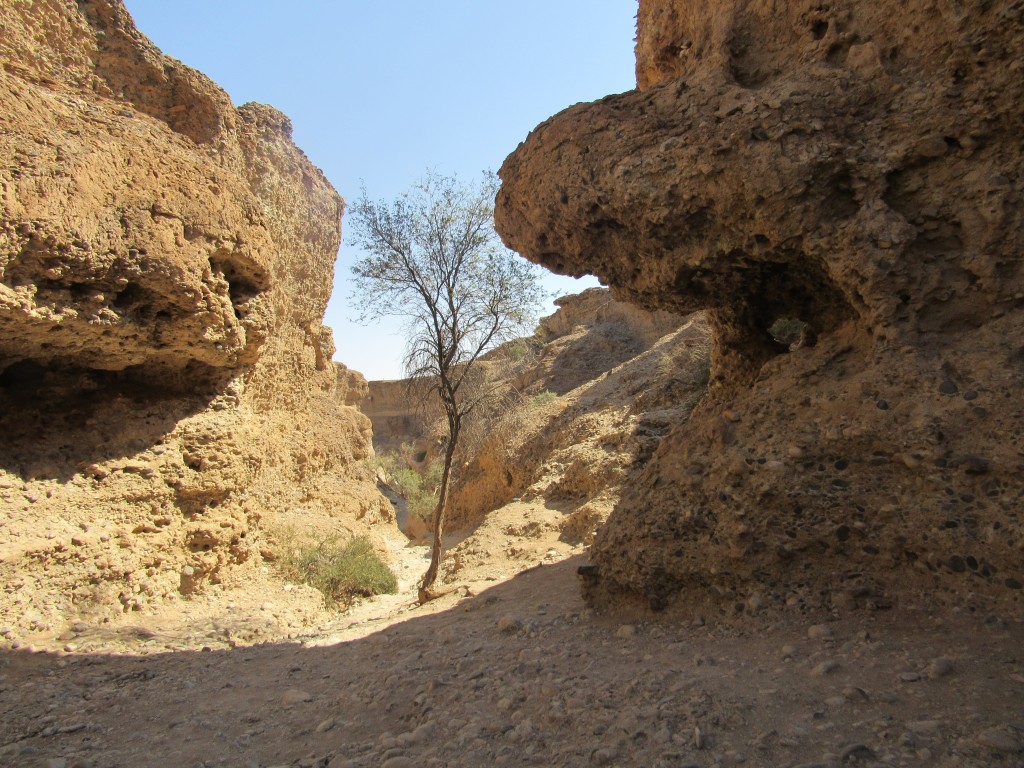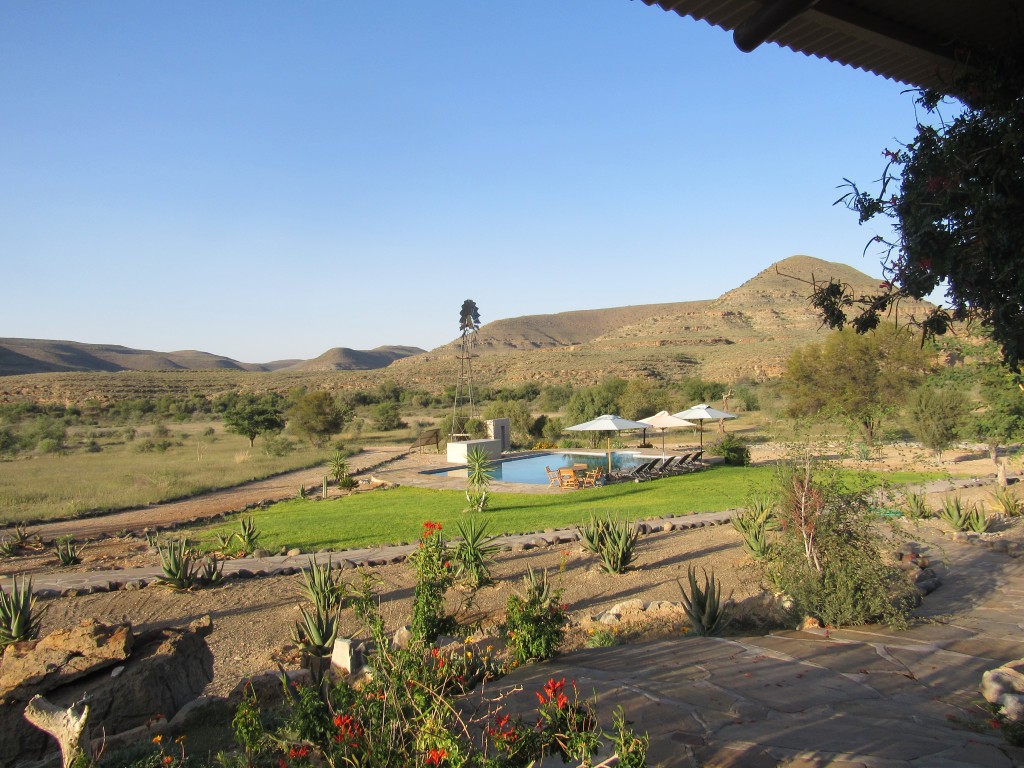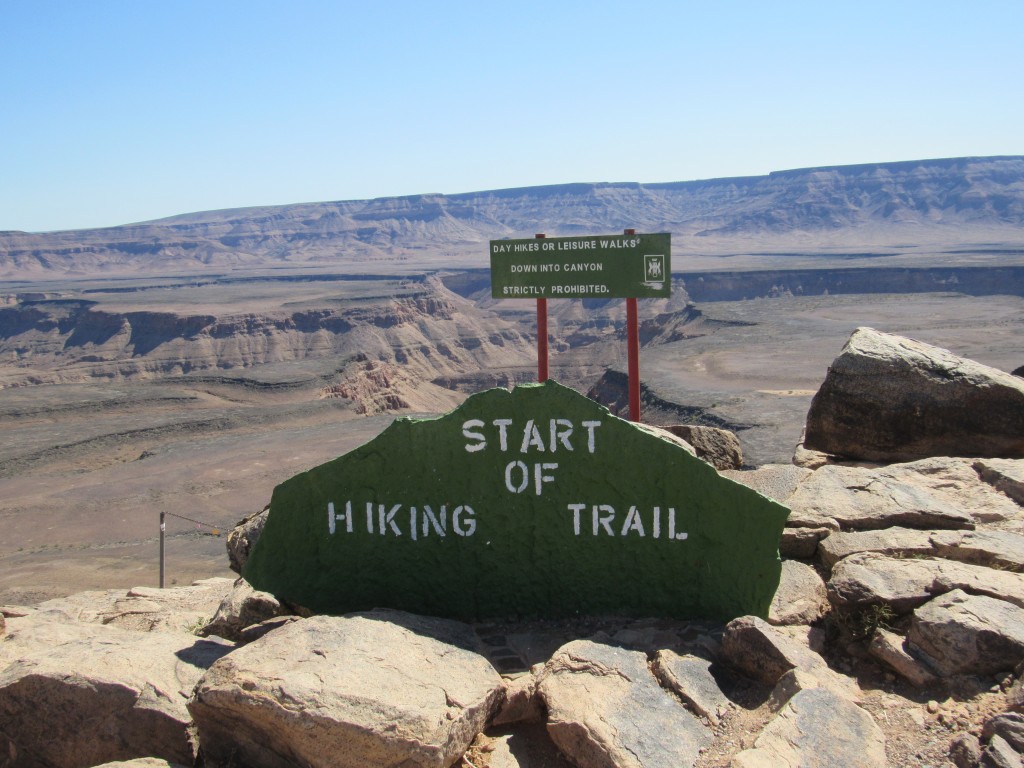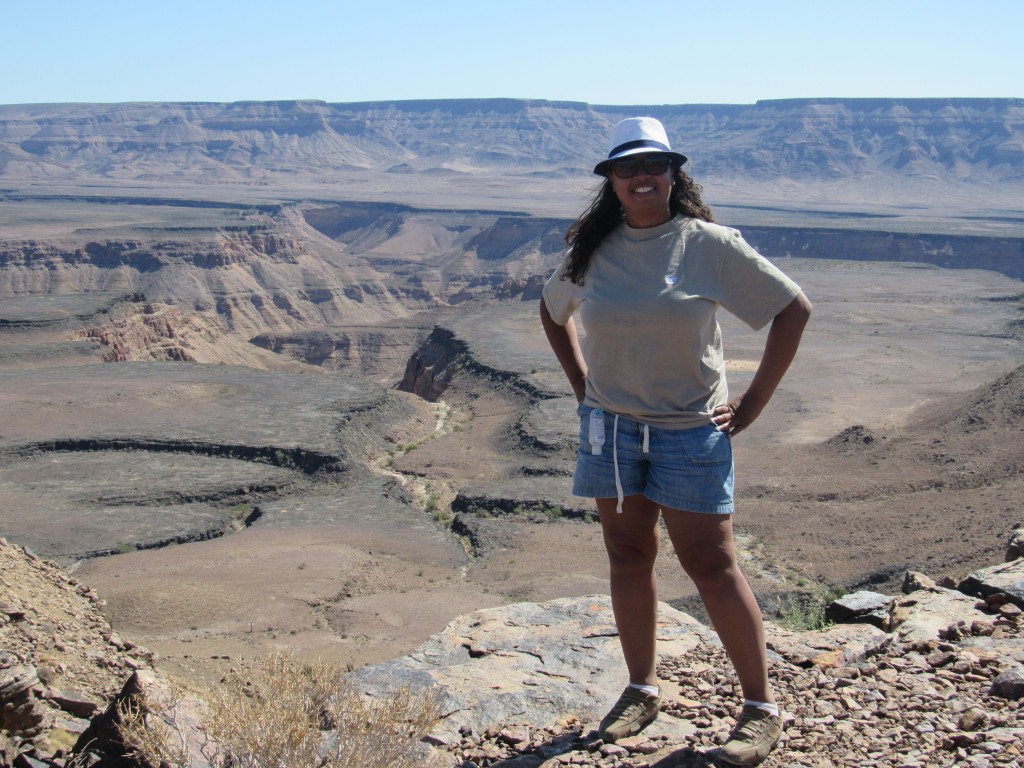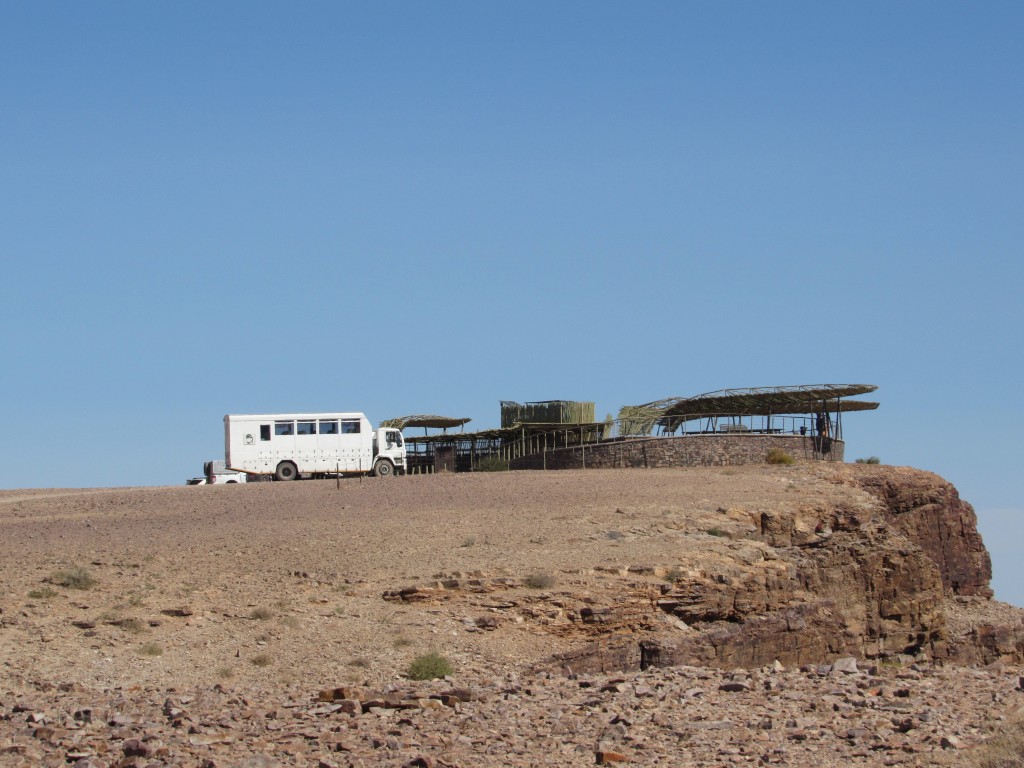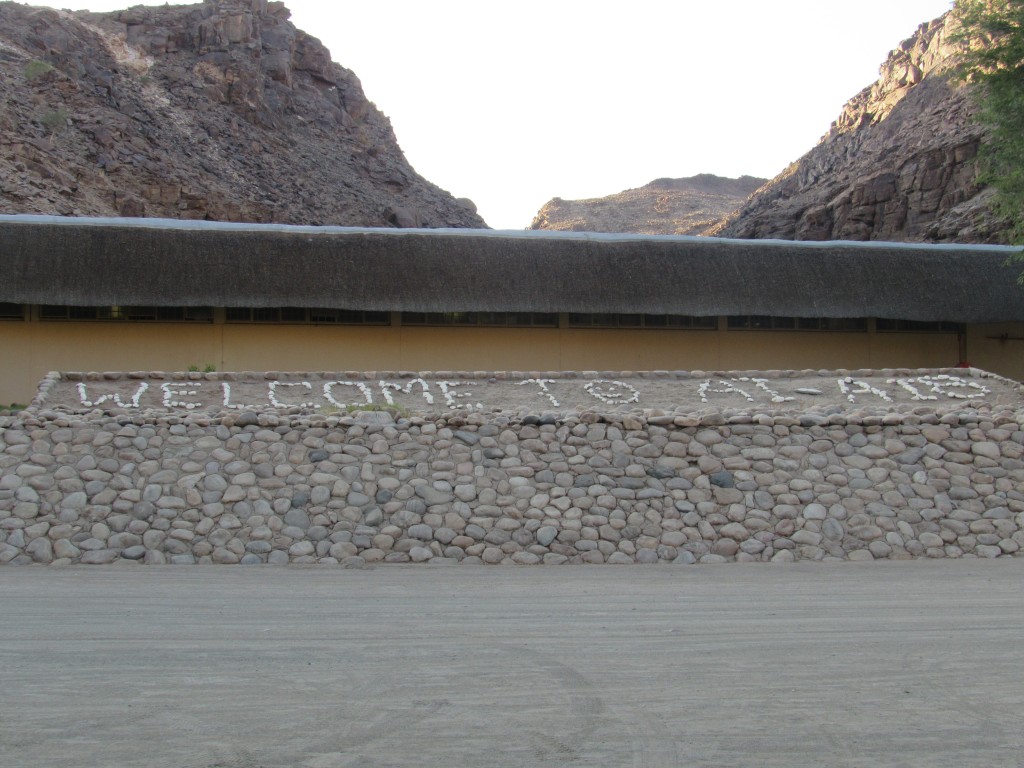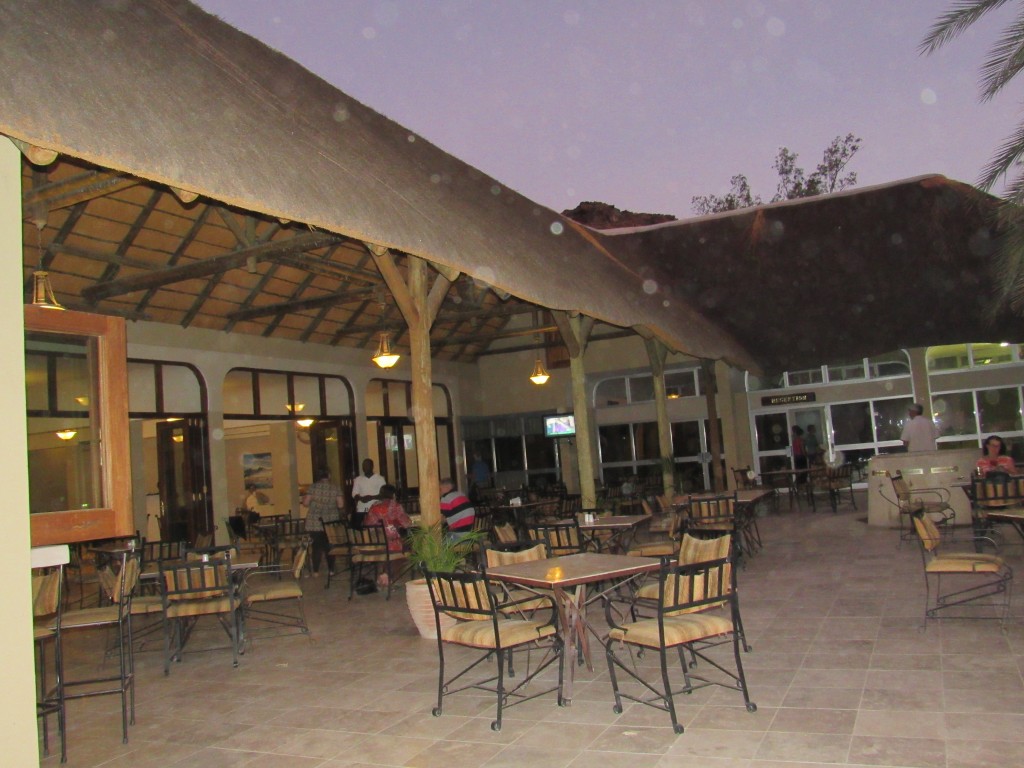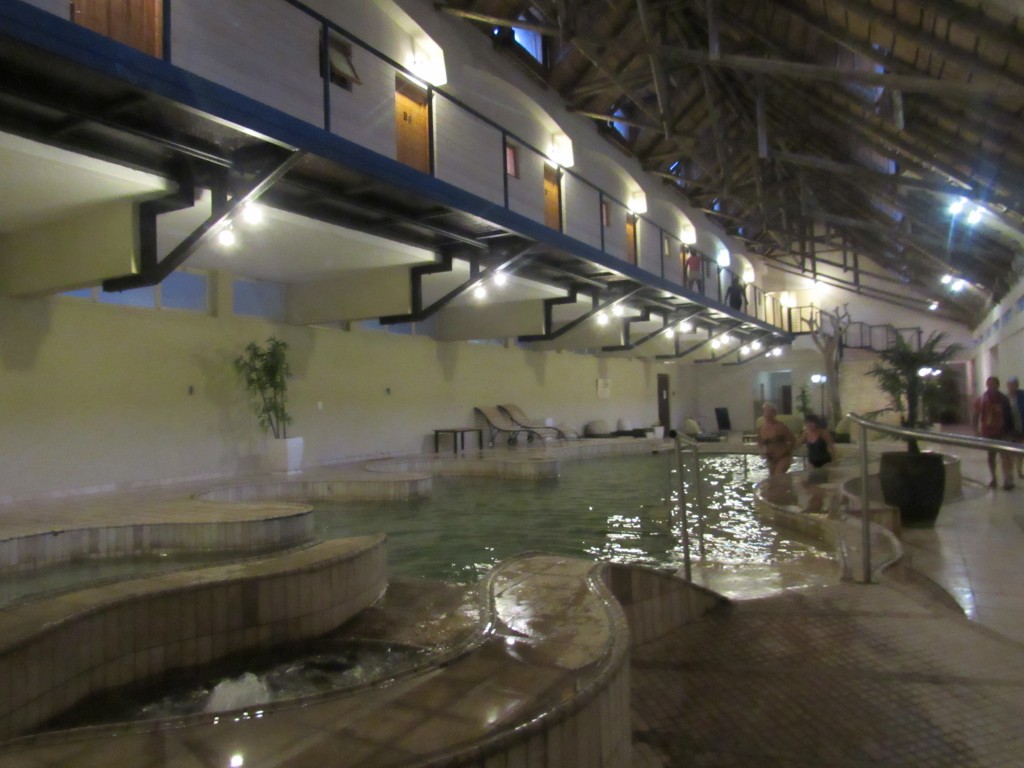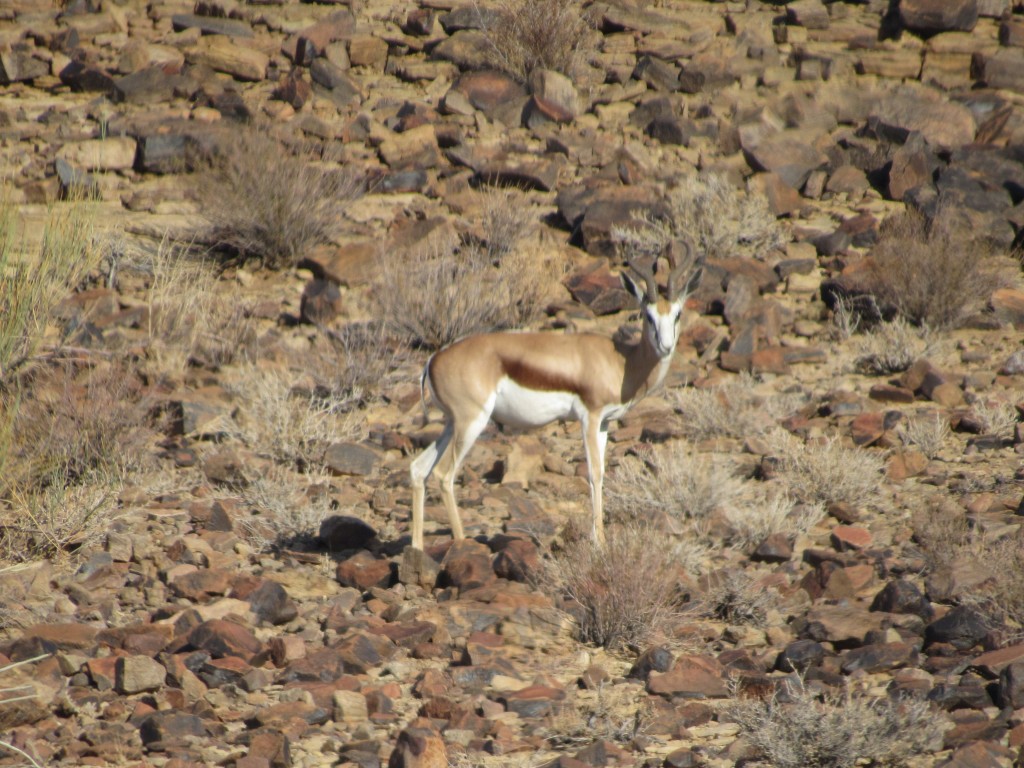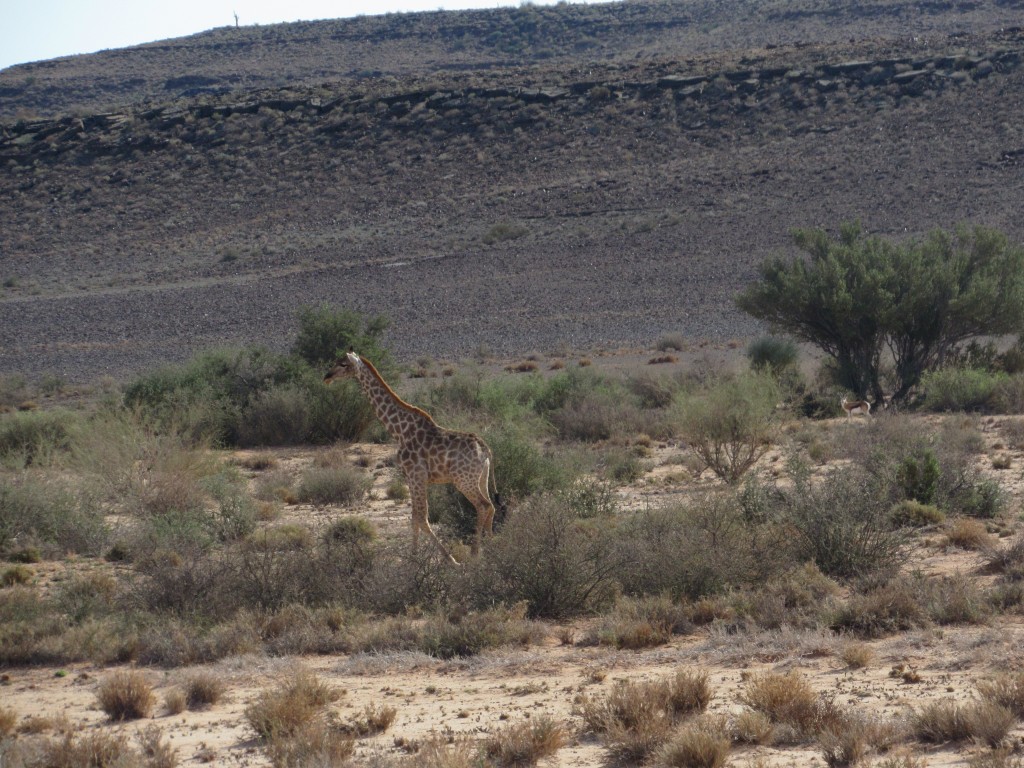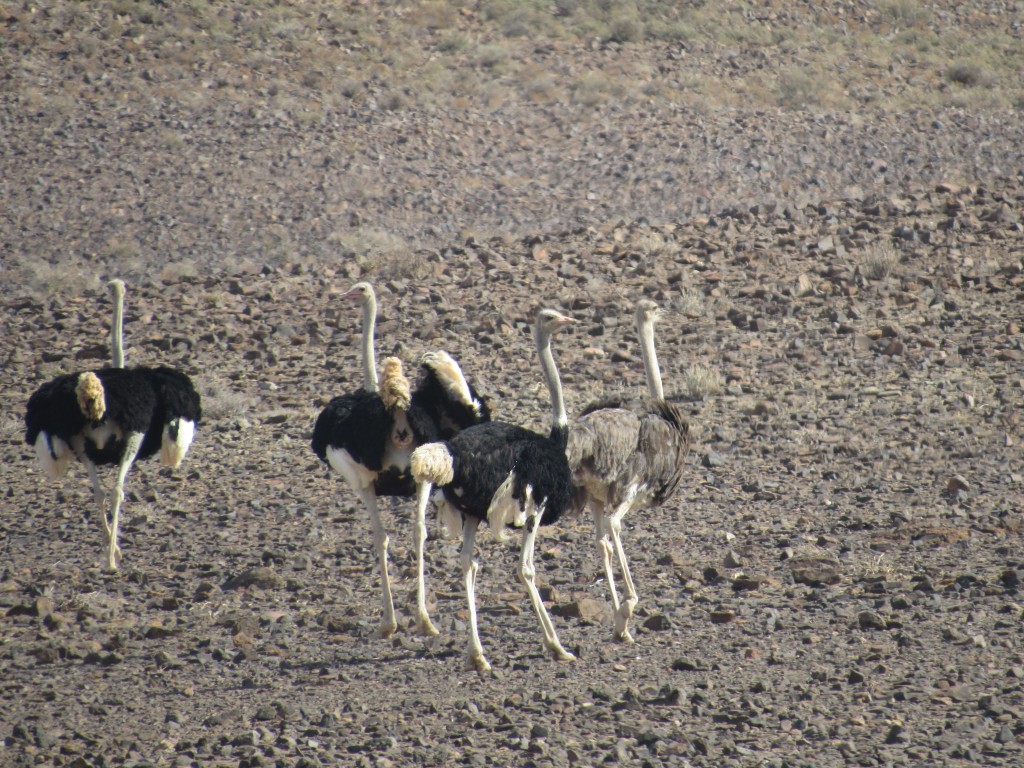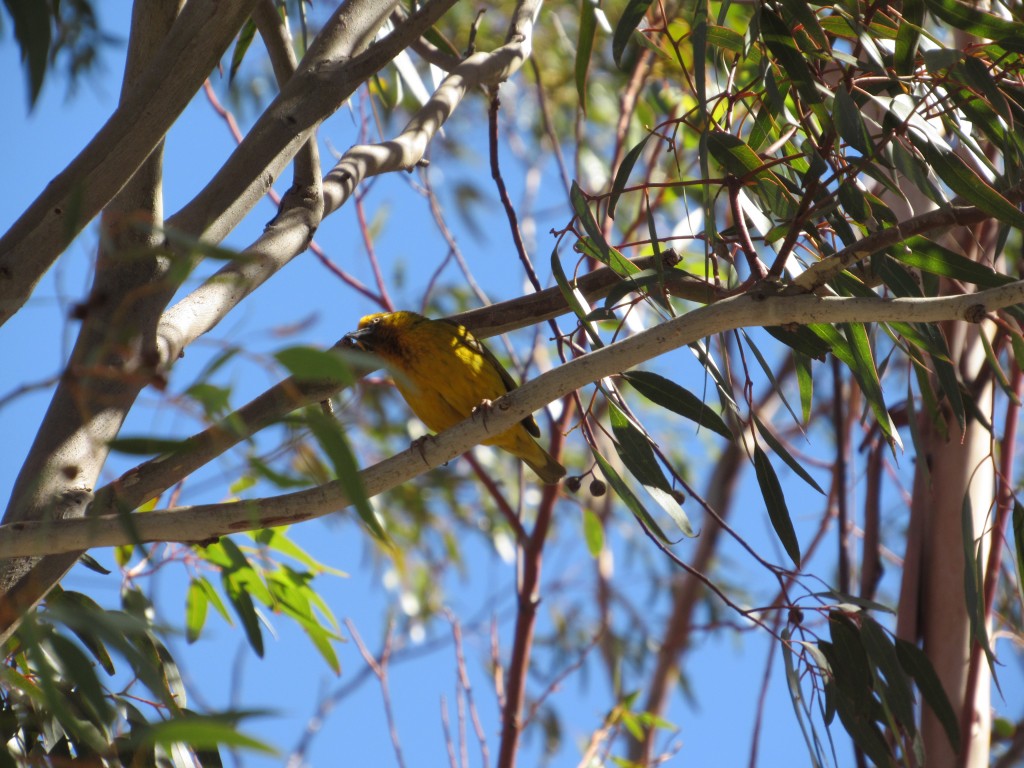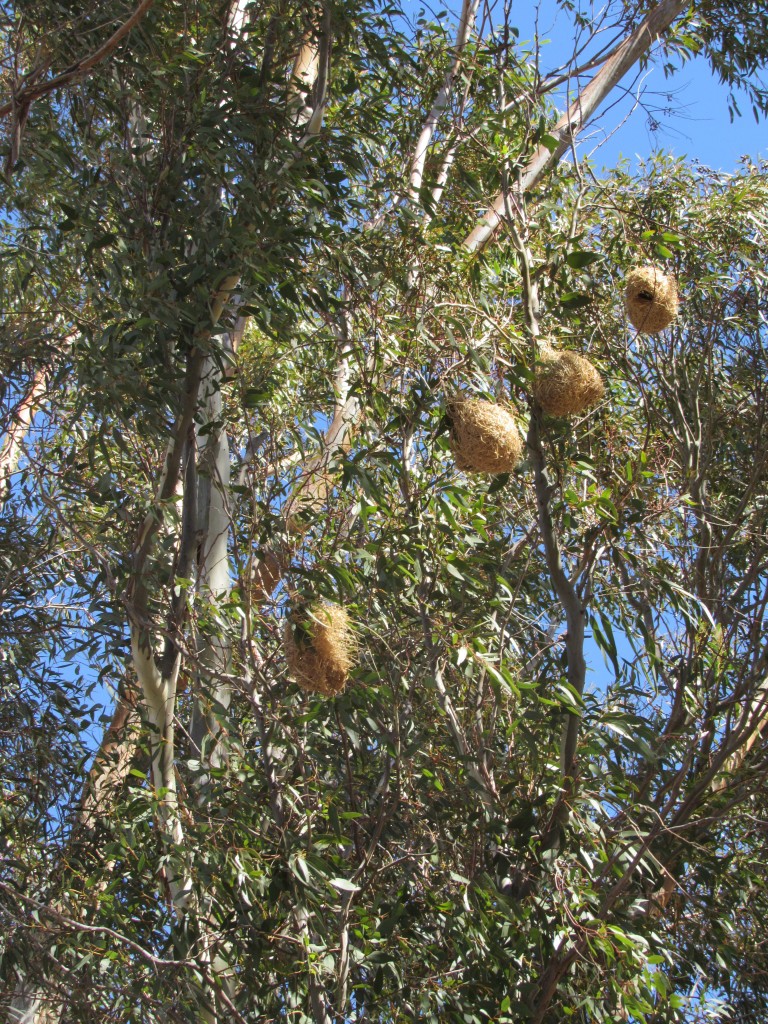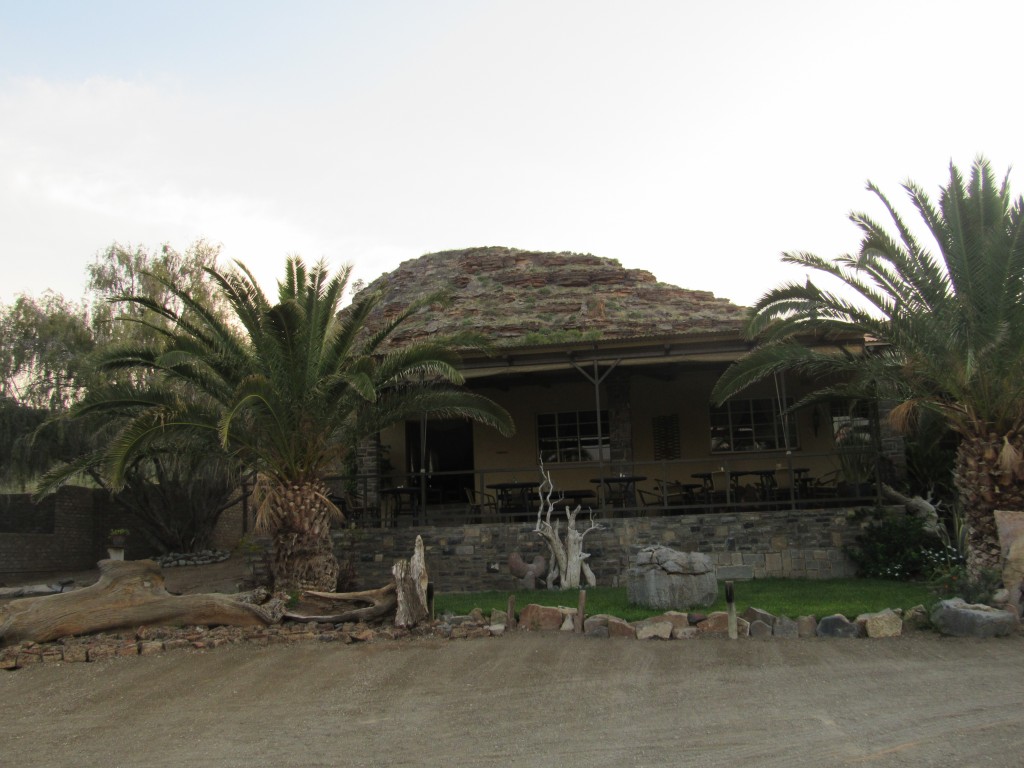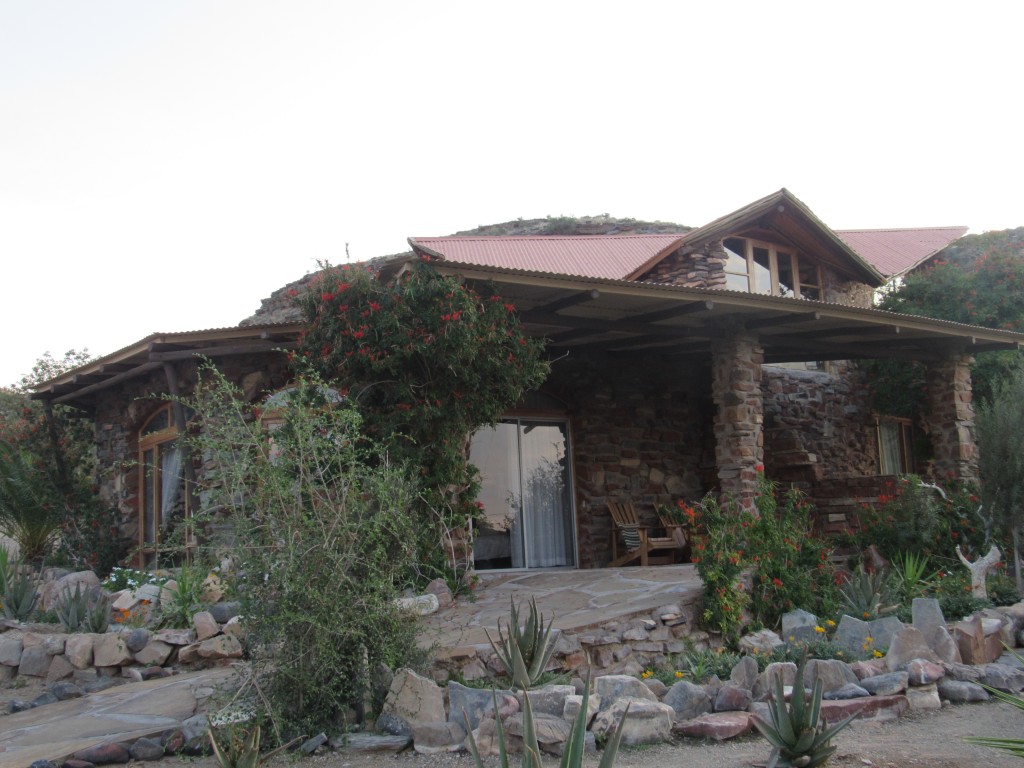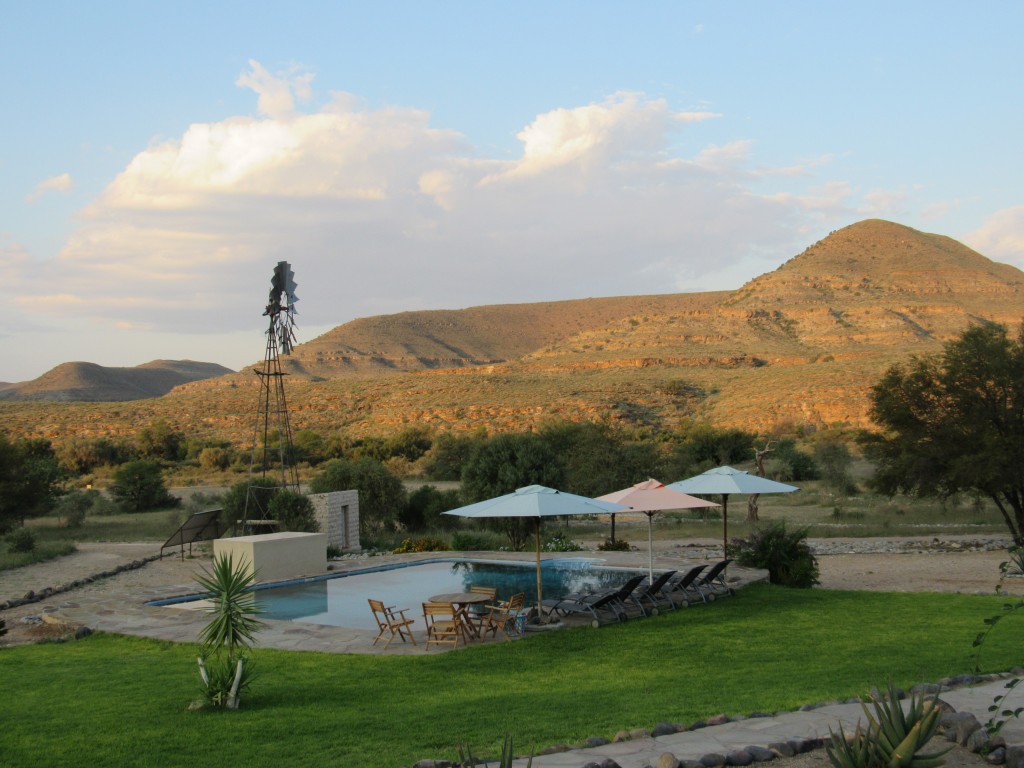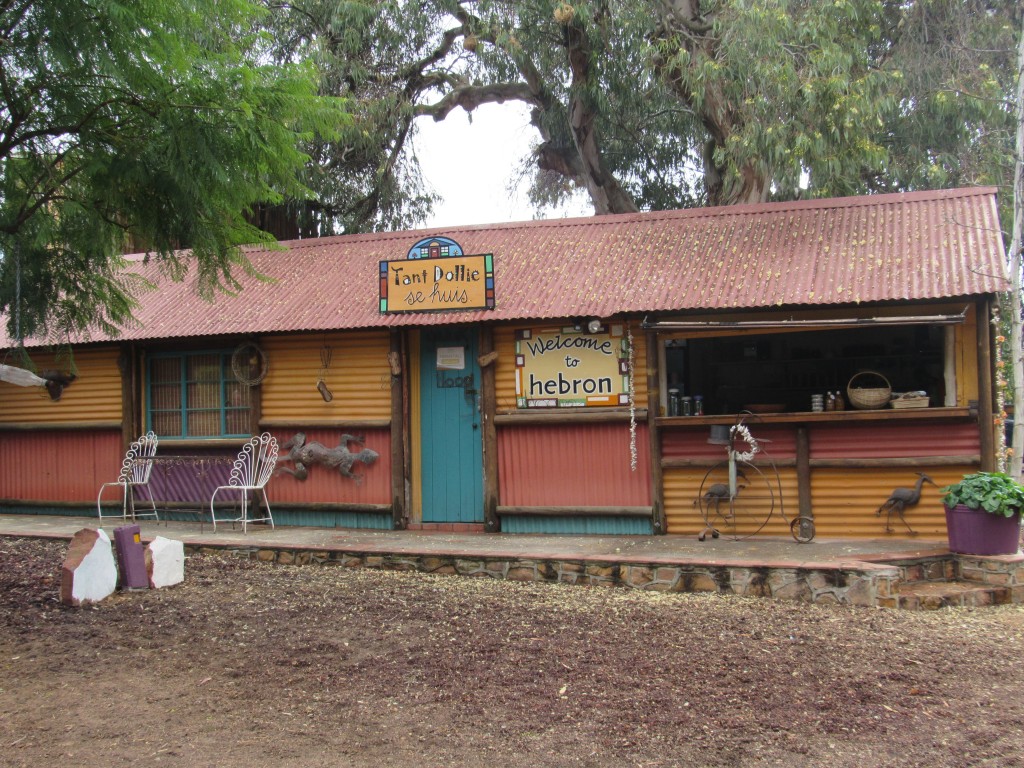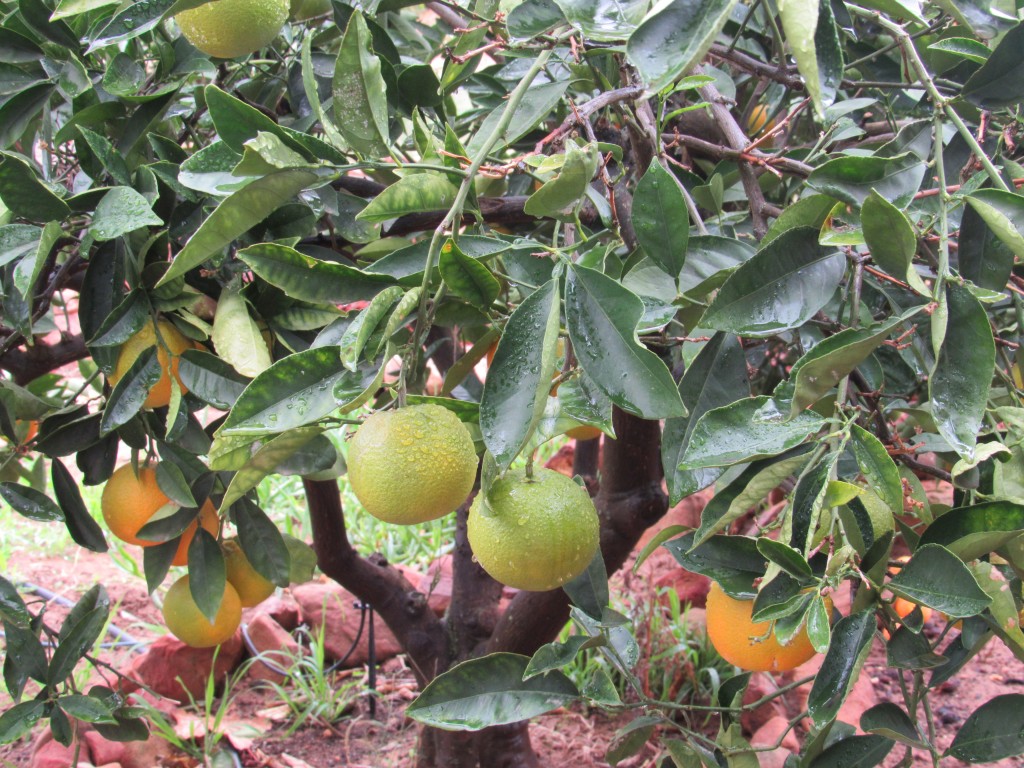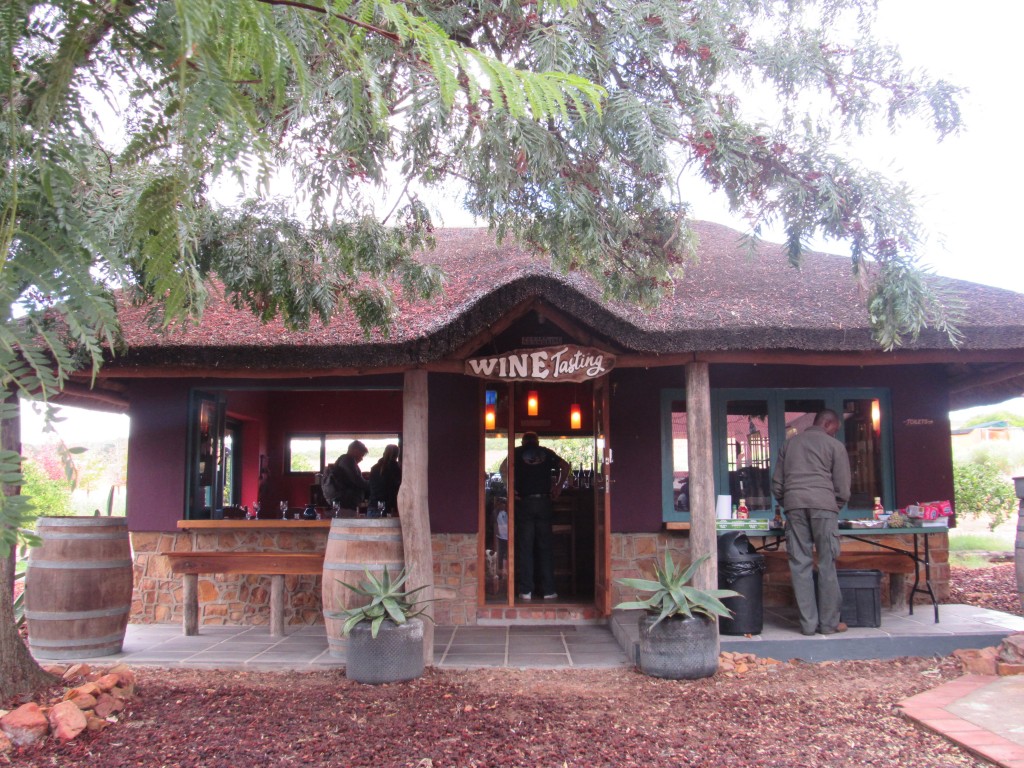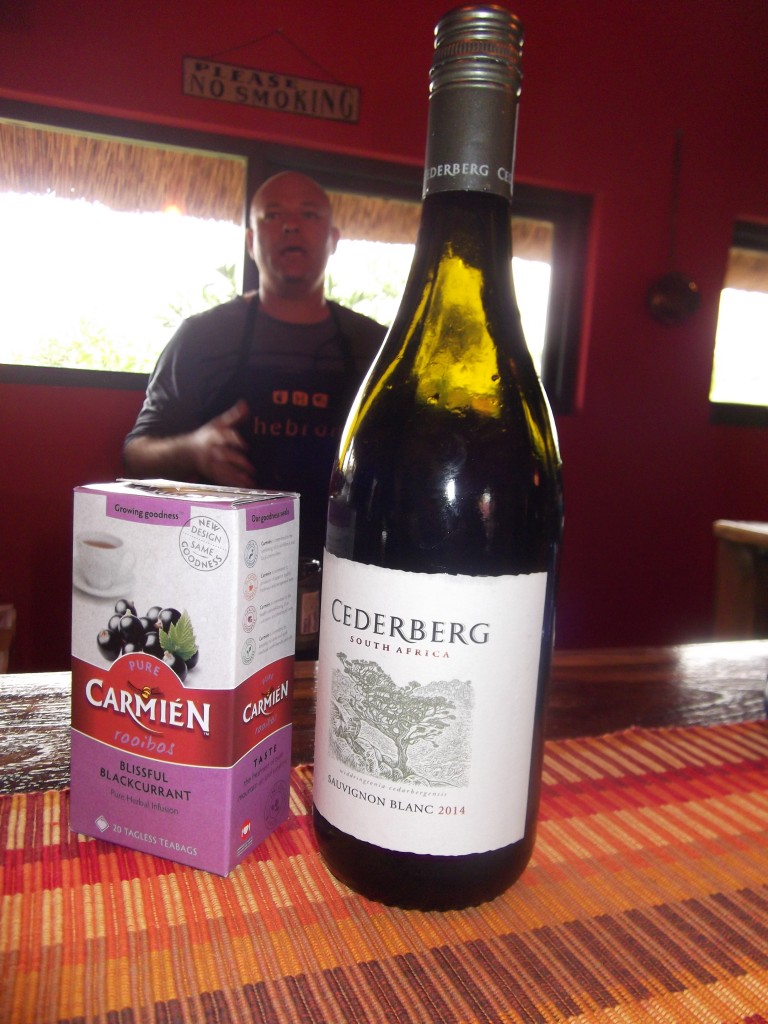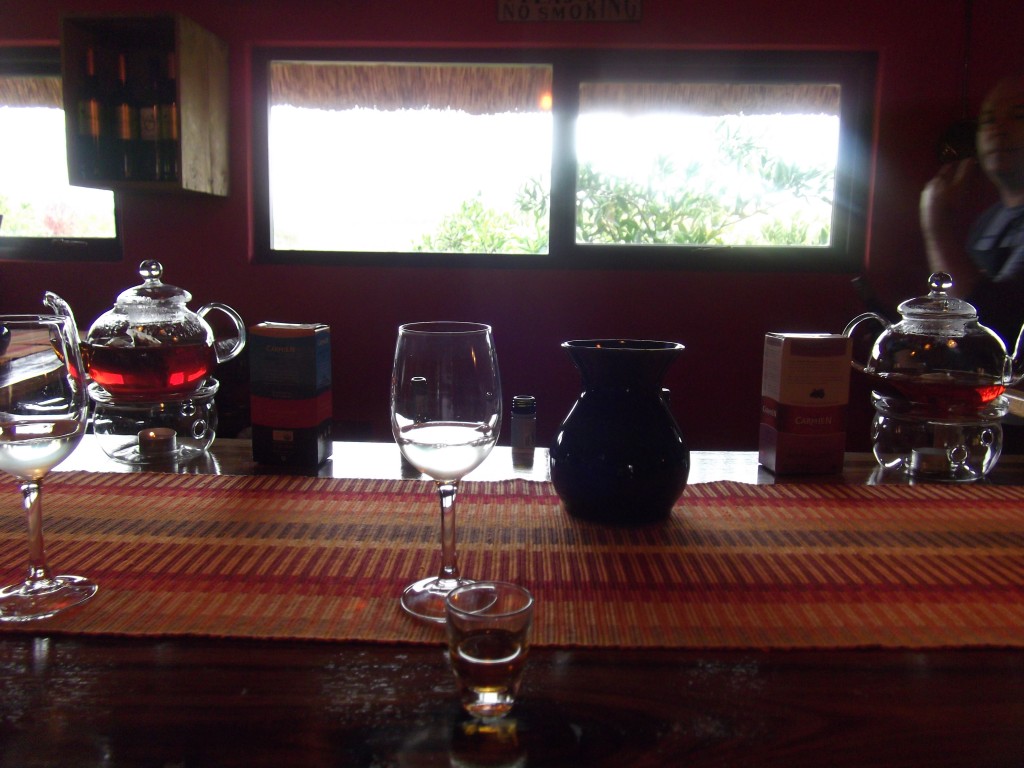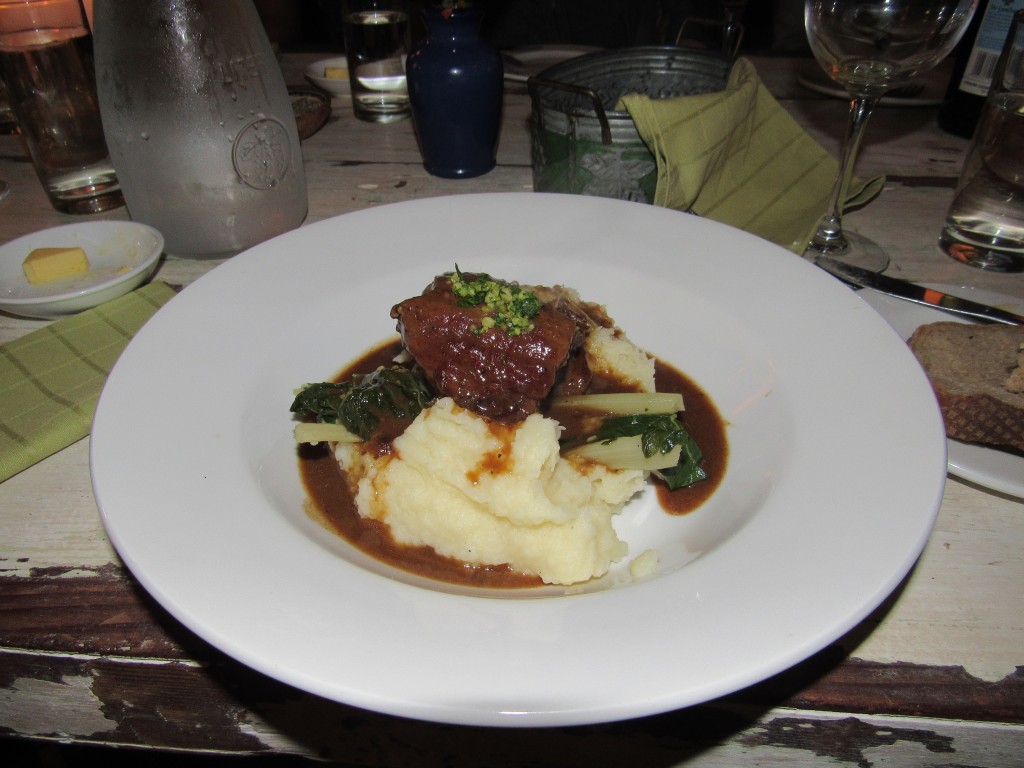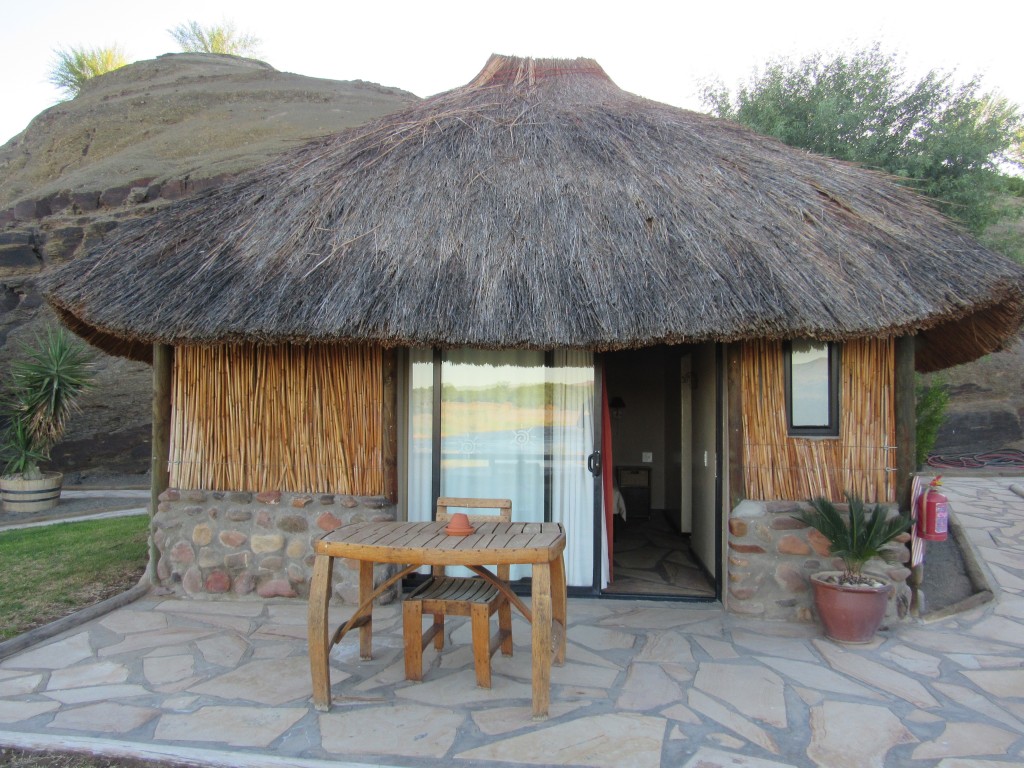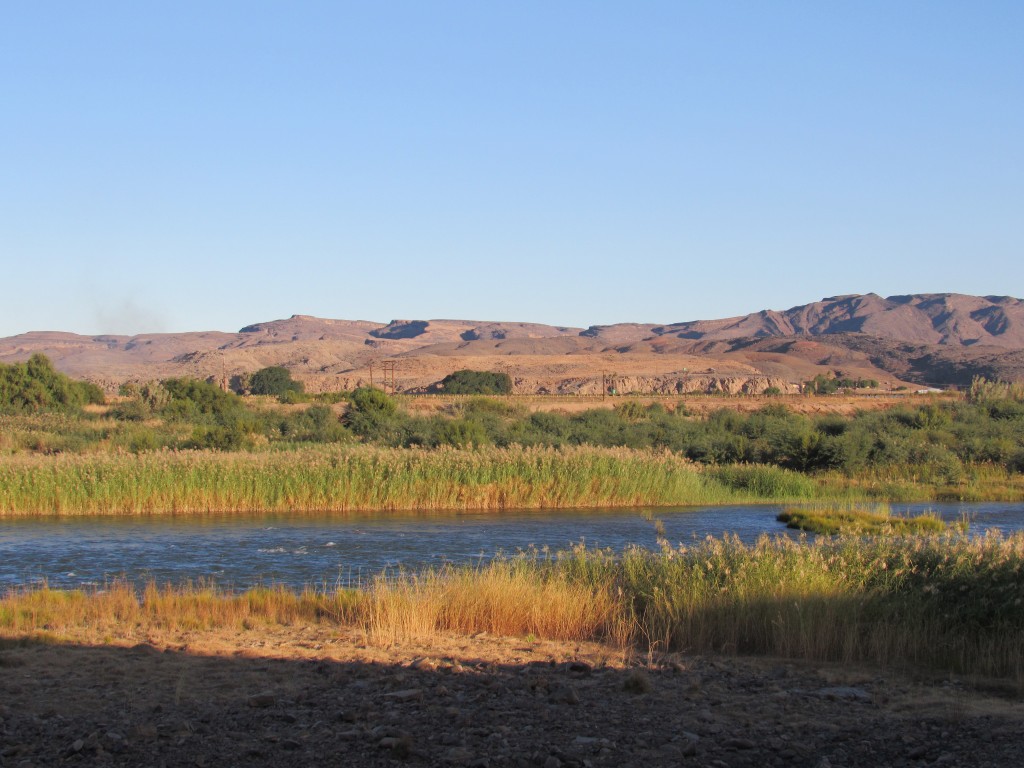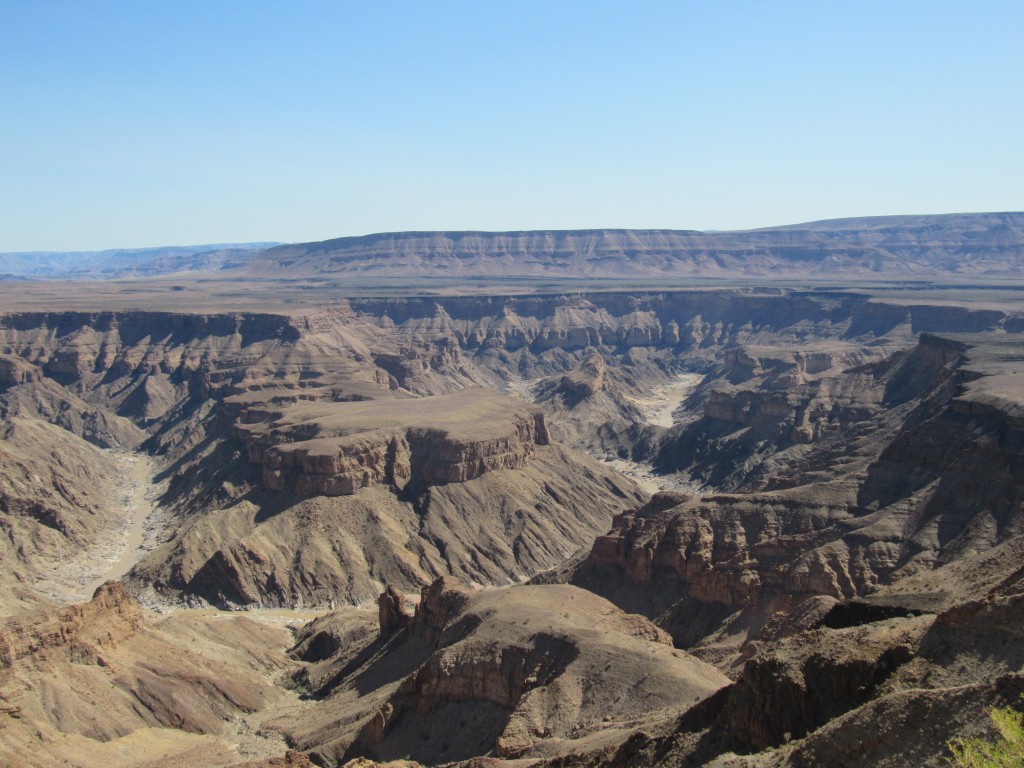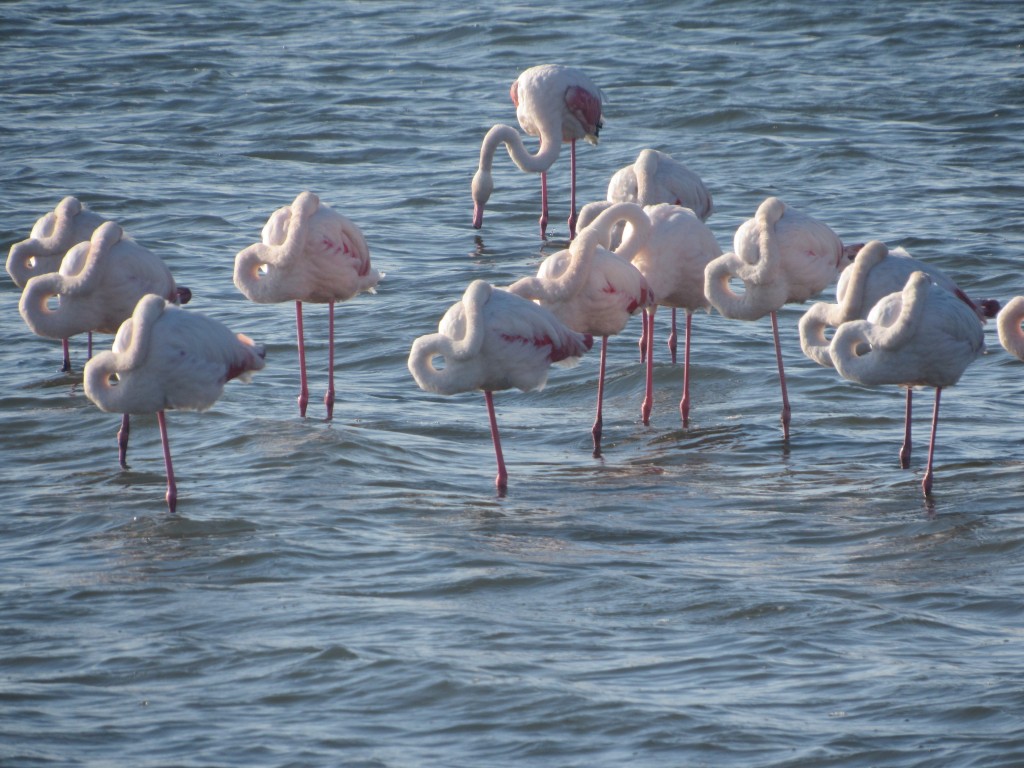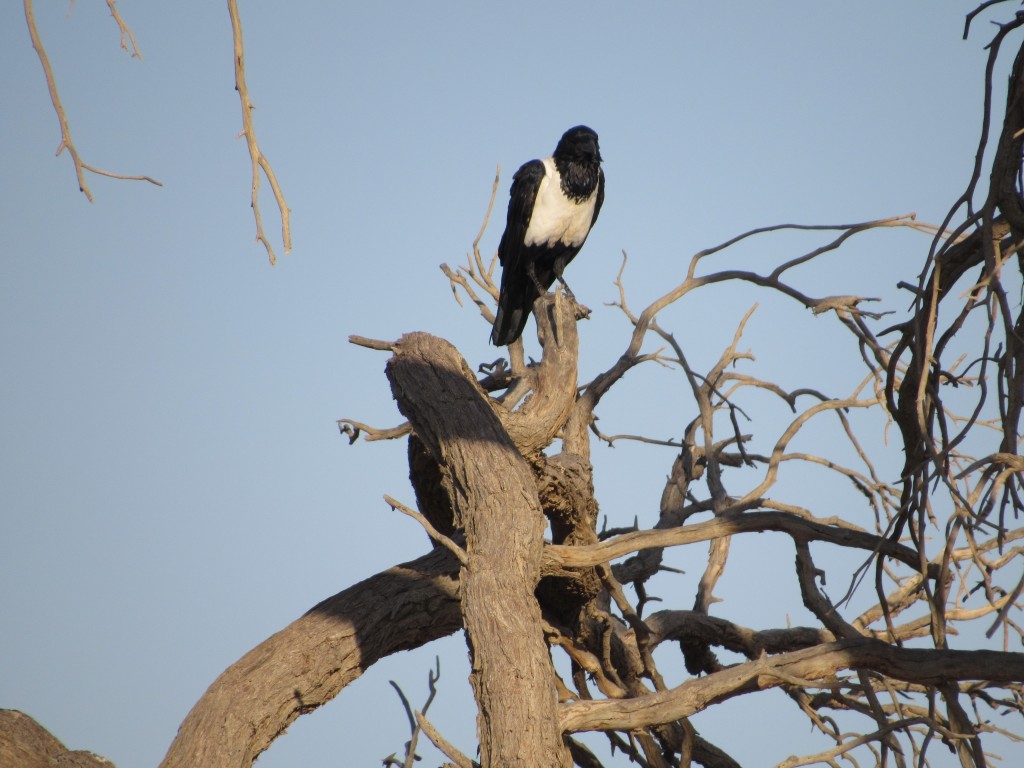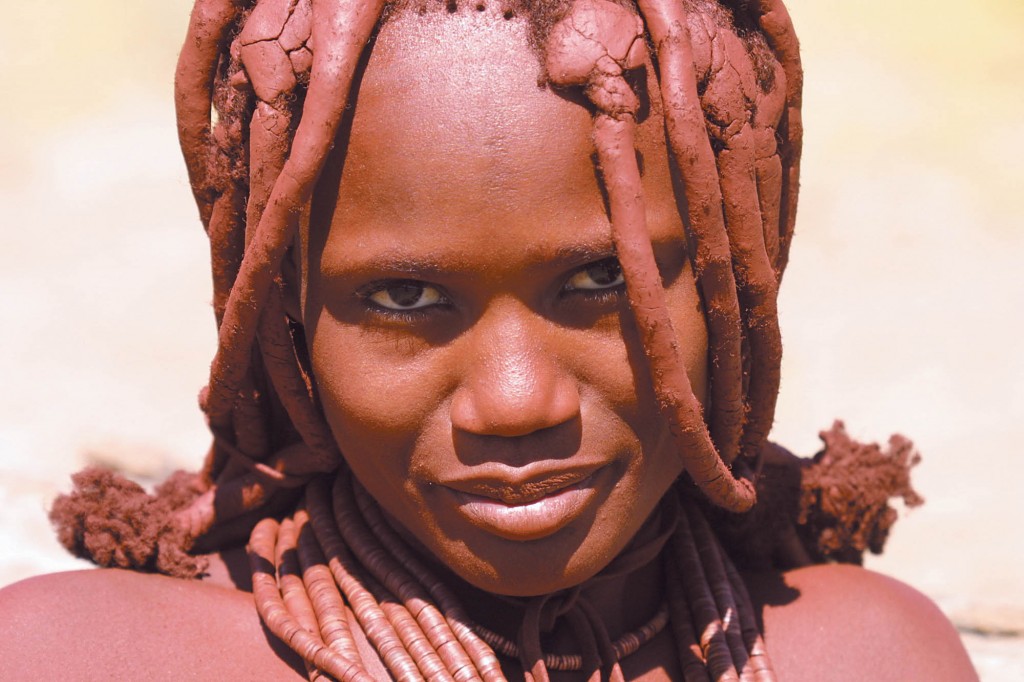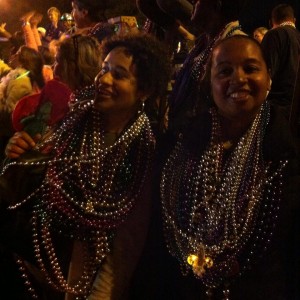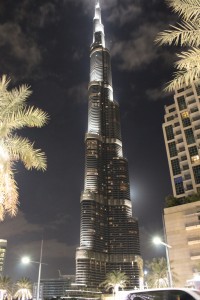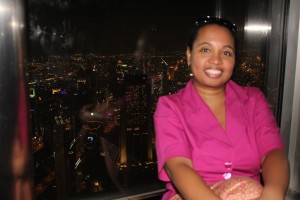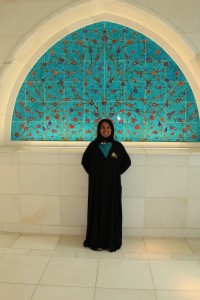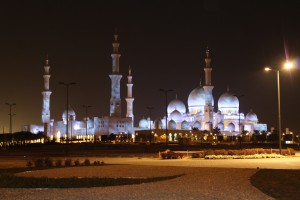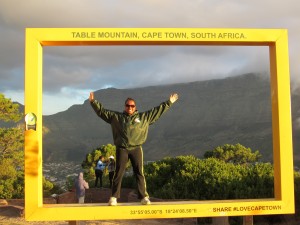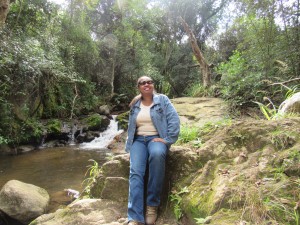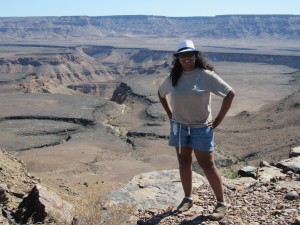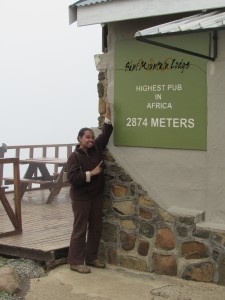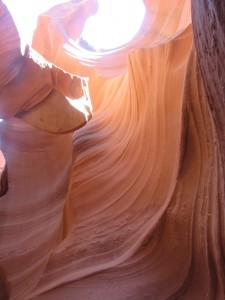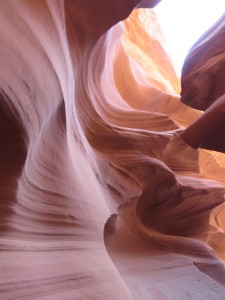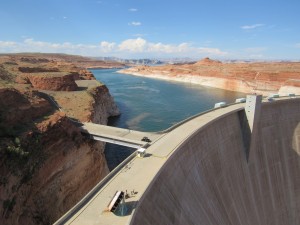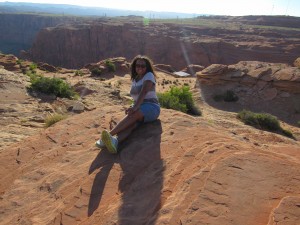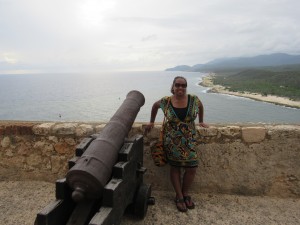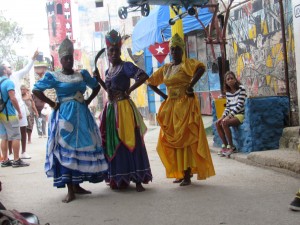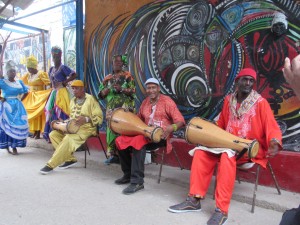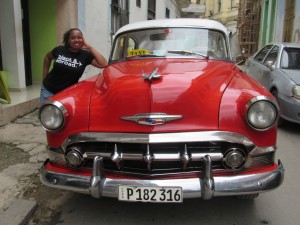The post Namibia Overland: Swakopmund first appeared on The Travel Sista.
]]>I ate a hot cooked breakfast, then left around 9:00 am for my quad biking and sand boarding tour. Lucky for me, I was the only one scheduled and it turned into a private tour. I was fitted for a helmet, then my guide and I hit the sand dunes, riding along a set trail so we wouldn’t injure or kill the protected wildlife there. The landscape was magnificent, but I was hopelessly lost as we traveled deeper and deeper into the maze of sand dunes.
About an hour later, we stopped at one of the larger dunes for my sandboarding adventure. Since it was my first time, I had chosen the “Lie Down” sandboarding style (where you lie on the board and ride the dunes headfirst). My guide waxed the board and rubbed it with sand to prepare it for riding. Then he had me lay down on the board with the front slightly raised and my feet hanging over the back. I was a tad bit nervous and briefly questioned my sanity as I looked down. But I gave the OK and my guide nudged the board sending me off. My adrenaline kicked in as I sailed down the dune at breakneck speed. The ride was exhilarating but over in seconds, and I had to hike back up the dune (which was a chore). I rode down a second time and luckily this time my guide rode me back up on the quad bike.
After two runs, I’d had enough sand boarding and so we took off on the quad bikes to search for desert wildlife. The desert appeared lifeless at first glance, but upon a closer look it was alive with a variety of desert-adapted wildlife. My guide pointed out various hidden animals, including geckos, lizards, beetles, and spiders. The final highlight was seeing where the edge of the desert meets the Atlantic Ocean.
By the end of the ride, I was dirty, full of sand, and ready for a hot shower. After freshening up, I headed off to explore the town of Swakopmund. Situated on Namibia’s coast, Swakopmund is like a little Deutschland in Africa. The German colonial influence is present in the architecture and general ambience, and many of the retail stores and restaurants are German-owned.
I had worked up a serious appetite and stopped for lunch at The Fish Deli, a local seafood restaurant, where I ate fried hake and chips. Later, I walked the sea-front promenade, eating homemade ice cream while viewing the jetty, lighthouse, and exquisite waterfront homes in the area. I would be remiss if I didn’t admit I had mixed emotions about these obvious remnants of colonialism and apartheid.
I spent the last evening talking with one of my tour guides, Alfons, a native Namibian. We talked about past and present Namibian history, his heritage as a member of the Herero tribe, his multilingualism (English, Herero, and Afrikaans, which was required during the apartheid period), and his future plans to return to his village in northern Namibia. I left with a greater understanding of Namibia’s storied past and rich culture, and a strong desire to see more. I look forward to returning.
Have you been to Swakopmund, Namibia’s adventure capital? Did you participate in any adventure activities? Share your comments below.
Share ThisThe post Namibia Overland: Swakopmund first appeared on The Travel Sista.
]]>The post Namibia Overland: Namib-Naukluft Park first appeared on The Travel Sista.
]]>After an amazing Day 3 and 4, I was so enthralled with Namibia’s beauty that I didn’t think it could get any better. Little did I know that Day 5 would reveal a landscape so magical that it was like a scene from a movie. We left our lodge around 7:00 am and about an hour later arrived at Sesriem gate, the entrance to the Sossuvlei area of the Namib-Naukluft National Park. We were amazed by the enormous red sand dunes surrounding us at every turn.
We drove along the paved road for about 30 minutes before finally arriving at Dune 45, one of the most famous dunes, so named because it is located 45 km past the Sesriem gate. Dune 45 is 80 meters (262 feet) high and believed to be composed of 5 million year old sand. We stopped and climbed to the top to enjoy the mind-blowing views. The slippery sand made the hike up quite strenuous and by the time we made it back down, we had worked up a serious appetite. Lucky for us, our guides had prepared breakfast on the truck and it was ready and waiting for us.
After breakfast we continued on the paved road to Sossuvlei and Deadvlei, large salt-clay pans which are completely surrounded by some of the largest sand dunes in the world. The largest dune, named Big Daddy, measures 325 meters (1066 feet) high. Since Sossuvlei and Deadvlei are encircled, you must hike the dunes to get there. By then it was late-morning and the desert sun beamed on us like fire. We walked for about a mile to Deadvlei and when we finally arrived the view was surreal.
Deadvlei is marked by blackened dead acacia trees, which stand as a stark contrast to the white salt-clay pan and the red sand dunes. The trees, which are believed to have died 600-700 years ago, were scorched by the intense sun. They don’t decompose because it is so dry. We were living witnesses to the harshness of the environment and after walking back from Deadvlei, we were happy to see living trees with leaves, which we excitedly used for shade from the sun. Luckily, we were able to ride over to Sossuvlei in a covered 4×4 truck.
Next we stopped for lunch, then headed to the Sesriem Canyon, a natural canyon of sedimentary rock carved by the Tsauchab River. It measures approximately one kilometer (0.6 miles) long and up to 30 meters (100 feet) deep and is one of the few places in the area that holds water year round. Because it was dry season, we were able to climb down into the canyon to explore and examine the different rock formations.
It was late afternoon by the time we left Sesriem Canyon and we were hot, sweaty and tired. We returned to our lodge and once again I was able to sit on my patio and revel in the fascinating views of the Tsaris mountains. I even caught a glimpse of mountain zebras racing through the mountains. Life was good. Next up was Day 6.
Have you seen the sand dunes in Namibia? Share your comments below.
Share This
The post Namibia Overland: Namib-Naukluft Park first appeared on The Travel Sista.
]]>The post Namibia Overland: Fish River Canyon to Tsaris Mountains first appeared on The Travel Sista.
]]>After a fabulous Day 1 and 2, I awoke to a magnificent sunrise over the Orange River. Our guides had been up since 6:00 a.m. cooking breakfast, which we ate while discussing the day’s activities. We left around 9:00 a.m. and headed north to the Fish River Canyon, the world’s second largest canyon. Though visually not as majestic or breathtaking as the Grand Canyon (the world’s biggest), Fish River Canyon is still impressive and awe-inspiring in its own right. We enjoyed a scenic walk along the canyon’s edge before heading to the on-site camp area for a group prepared lunch of salad and sandwiches.
We left the canyon by mid-afternoon and drove to the Ai-Ais Hot Springs Resort, where we would spend the evening. Ai-Ais (pronounced eye ice) means burning water in the local Nama language and refers to the sulphurous thermal hot springs located at the base of the mountain peaks near the southern end of the Fish River Canyon. The resort filters the hot spring water into a massive indoor jacuzzi with three interconnected pools. I had a nice relaxing soak for about an hour, then returned to my room for a hot shower. I was so relaxed, that I dozed off and missed dinner with the group.
Day 4 – Ai-Ais – Tsaris Mountains
I woke up early the next morning, refreshed and ready for another day of adventure in the Namibian desert. I stepped out onto my balcony to take in the fresh air and gaze at the beautiful mountain views surrounding me. A short while later, I made the mistake of leaving the patio door open while I went to the bathroom. The next thing I know, I heard rustling in the room and ran back in time to see a monkey making his escape out the patio door. He had stolen some sugar packets and knocked the sugar bowl on the floor in the process. Needless to say, I was startled and immediately closed the door to avoid a repeat. Later that morning, we had a tasty buffet breakfast then hit the road around 8:30 a.m. This was a full day of driving, as we covered nearly 400 miles from southern to central Namibia. We saw the vast, desolate arid landscape and a variety of wildlife, including giraffes, ostriches, and mountain zebras. Along the way, we stopped for lunch at a roadside campsite. We ate sandwiches and salad, while scoping out local birds, flora and fauna. Our guides were a wealth of knowledge, and Alfons, who is Namibian and from the Herero tribe, was excited to share information about his country and culture.
By early evening, we arrived at Zebra River Lodge, where we stayed for two evenings. It was a small, secluded property, with individual cottages nestled deep in the Tsaris mountains. The grounds were meticulously landscaped, with breathtaking mountain and desert views. The large veranda was the perfect place to have drinks and watch the sun go down, and we spent the evening doing just that. It was another magical night in Africa and a prelude for what was to come on Day 5.
Have you traveled to Namibia or would you like to? Share your comments below.
Share ThisThe post Namibia Overland: Fish River Canyon to Tsaris Mountains first appeared on The Travel Sista.
]]>The post African Overland Adventure: Cape Town to Namibia first appeared on The Travel Sista.
]]>Day 1 – South Africa, Cedarberg Region
As instructed, I arrived at the Nomads Cape Town office at 7:30 a.m. with one soft duffle bag and a backpack (we’d been instructed not to bring roller bags or large pieces of luggage because they could not fit on the truck). After checking in, we boarded the large truck, secured our bags in the on-board lockers, and met our guide, Gift, and driver, Alfons. After a quick de-briefing and group introductions, we left around 8:30 a.m. and headed to Table View, a Cape Town suburb named for its view of Table Mountain from across Table Bay. Unfortunately for us, a thick fog partially obscured the beautiful view and dashed our dreams of capturing the perfect photo. By early afternoon, we arrived in Citrusdal, a small village in the Cedarberg region known for its abundance of citrus orchards and rooibos plants which are endemic to the area. There we stopped at Hebron — a working farm, restaurant, guesthouse and farmstall — for lunch and tastings of locally-produced rooibos tea and wine. We tasted two flavored rooibos teas, vanilla and black currant, and three wines, Chardonnay, Sauvignon Blanc, and Merlot, all of which were tasty. After the tasting we checked into our hotel and relaxed for several hours before heading back to Hebron for a private dinner. The owner, Chef Steve, cooked a succulent meal of steak, mashed potatoes and gravy, and sautéed spinach, which was accompanied by a local Chardonnay we purchased during the earlier tasting. For dessert, he made a flourless cake with raspberry sauce, which was also delicious. It was the perfect ending to a wonderful day and the perfect start to a fantastic week.
Day 2 – Namibia, Gariep (Orange) River
We woke up early the next morning, and after a tasty buffet breakfast at the hotel, we hit the road headed north towards the Namaqualand region in the Northern Cape of South Africa. About four hours later, we arrived in Springbok, the capital of Namaqualand. Though we wouldn’t see it, Namaqualand is best known for the annual spring phenomenon (July to September) when millions of wild flowers bloom to life transforming the normally dry landscape into an explosion of color. After a quick bit of shopping, sightseeing and lunch, we returned to the road, finally arriving at the South Africa-Namibia border about two hours later. We entered Namibia at the Noordoewer/Vioolsdrif border crossing and proceeded on about 15 minutes later after getting our passports stamped. We were pleasantly surprised when we arrived at our nearby lodging, Felix Unite Camp, located on the banks of the Orange River. Our thatched huts had private patios and stunning mountain and river views. While some of the group went hiking or swimming, I spent the rest of the day sitting on my patio, drinking wine and taking it all in. The setting was just magical.
Stay tuned for Days 3 and 4
**This tour was booked by Detour Africa, which graciously offered a discount for my review. All descriptions and opinions are my own. Detour Africa offers a variety of private and group tours and safaris, catering to any budget, large or small.
Share ThisThe post African Overland Adventure: Cape Town to Namibia first appeared on The Travel Sista.
]]>The post The Top 7 Things to See and Do in Namibia first appeared on The Travel Sista.
]]>- Fish River Canyon
Located in southern Namibia, the Fish River Canyon is Africa’s largest canyon and second in size only to the Grand Canyon in Arizona. Unlike the Grand Canyon which was formed by water erosion, the Fish River Canyon was formed by the collapse of the valley bottom due to movements in the earth’s crust. The canyon offers magnificent views and photo opportunities. For the adventurist traveler, the Fish River Canyon hiking trail offers a challenging hike which covers a distance of 54 miles over 5 days in the base of the canyon. Since there are no facilities, hikers must carry all supplies on their back and find water in semi-permanent pools. Because of its arduous nature, a medical certificate of fitness is required before hikers can commence the hike.
- Namib-Naukluft National Park
The Namib-Naukluft National Park encompasses part of the Namib Desert (considered the world’s oldest desert) and the Naukluft mountain range. The most well-known and visited area of the park is Sossuvlei, a salt and clay pan surrounded by massive red sand dunes. Other landmarks in the park include Deadvlei, Hiddenvlei, Sesriem, the petrified dunes, Dune 45, and Big Daddy (the largest sand dune in the area at 1066 feet). The desert scenery is stunning and the area provides the perfect backdrop for amateur and professional photographers alike.
- Swakopmund
Swakopmund is known as Namibia’s adventure capital and for good reason. Popular extreme sport activities include sand boarding, quad-biking, hot air ballooning, dune skiing, skydiving, kite surfing, paragliding, and power kiting, among others. In the city, German buildings adorn the palm-tree lined streets and serve as a stark reminder of the city’s colonial past. The feel is more like a German village rather than an African city. Popular landmarks in the seaside town include the Swakopmund lighthouse and the jetty, which houses two waterfront restaurants.
- Walvis Bay
Walvis Bay is Namibia’s main harbor town and is best known for the colony of flamingos that make their home on the city’s lagoon. Other attractions include Bird Island, a man-made structure inhabited by 200,00 birds and used for the production of guano, and Dune 7, the highest sand dune in the area. A unique experience is the 30 mile drive over sand dunes to Sandwich Harbor, a freshwater lagoon is surrounded by dunes. Sandwich Harbor is a sanctuary for large numbers of coastal and fresh water birds. A four-wheel drive vehicle and entry permit is required.
- Etosha National Park
Located in northwestern Namibia and spanning an area of 8,600 square miles, Etosha National Park is Namibia’s prime wildlife location. Etosha, which means “great white place” in the language of the Ovambo tribe, is dominated by a massive salt pan which covers about 25% of the park. Etosha is home to hundreds of species of mammals, birds and reptiles, including elephants, giraffes, lions, buffalo, leopards, zebras, cheetahs, and the endangered black rhinoceros. The abundant wildlife gives you almost guaranteed game sightings. The park has several lodges and camping facilities, all of which have game-proof fencing. An added plus is that the park is malaria-free.
- Kunene region/The Himba Tribe
The Himba are an ancient tribe of semi-nomadic herders who live in the Kunene region, in the barren northwest region of Namibia. Because of the harsh desert climate and their seclusion from outside influences, the Himba have managed to preserve much of their culture and traditional lifestyle. Himba men and woman typically wear only a loin cloth or goat skinned mini-skirt. Himba women are known for their use of otjize, a paste of butter, fat and red ochre which they apply to their hair and skin, and which gives their appearance a distinctive red hue. Due to their secluded location and lifestyle, the Himba are best visited with a local guide who can communicate in their OtjiHimba language.
- Windhoek
Windhoek is the capital and largest city in Namibia. The city is clean and modern, albeit small as far as capital cities go. Due to its close proximity to Hosea Kutako International Airport, most tourists will begin or end their visit in Windhoek. Notable landmarks include Zoo Park, the National Library of Namibia, the Supreme Court of Namibia, the three castles of Windhoek, Tintenpalast (German for Ink Palace and the seat of both chambers of the legislature), and the National Museum of Namibia (which has interesting displays on Namibia’s independence movement and anti-apartheid struggle). Windhoek is also home to Namibia’s brewing industry and several shopping malls.
Have you visited Namibia? What was your favorite thing to see or do? Share your comments below.
Share ThisThe post The Top 7 Things to See and Do in Namibia first appeared on The Travel Sista.
]]>The post Farewell 2015, Hello 2016 first appeared on The Travel Sista.
]]>I started off the year with a road trip to New Orleans for Mardi Gras. I hung out with family, ate plenty of shrimp, beignets and gumbo, collected lots of beads, and even snagged a coveted coconut at the Zulu parade.
Thanks to a $178 glitch fare on Etihad Airlines, I touched down on the Asian continent for the first time with visits to Dubai and Abu Dhabi. I rode to the top of the Burj Khalifa, the world’s tallest skyscraper, wore an abaya for the first time, and toured the magnificent Grand Mosque. This was my first foray into the Middle East and it surprisingly had me yearning to see more.
I also returned to the Motherland thanks to the Etihad glitch, with visits to four countries in southern Africa. I attended the Cape Town Jazz Festival, hung out on Durban’s Golden Mile, visited Nelson Mandela’s childhood home and final resting place, drove the Panorama Route, and delighted in the animals at Kruger National Park in South Africa. I rode the infamous Sani Pass, went pony trekking, and stayed in a village in the mountains of Lesotho. I saw the Fish River Canyon, went sand boarding for the first time, and climbed a 260-foot sand dune in Namibia. And I trekked to Mantenga Falls and Ezulwini Valley in Swaziland. It all made me love Africa even more.
I stayed stateside over the summer, with visits to Navajo country and the Big Apple. I shot plenty of pictures at Antelope Canyon and Lake Powell in Arizona, but photographs just don’t do them justice. The entire area is nothing short of beautiful and amazing. If you haven’t yet been, you ought to. I also made a quick run to Brooklyn and was able to take in the Atlantic Antic Festival. As always, I marveled in the frenetic pace and the diversity of New York.
I ended the year with a visit to Cuba – the one place I’ve wanted to see for years, but never thought I’d be able to due to the US embargo. As a lover of Afro-Cuban music and salsa dancing, Cuba was everything I hoped for and more. I pray that the thawing of US-Cuba relations will lead to increased prosperity and opportunity for the Cuban people, who are some of the nicest folks on the planet.
I haven’t yet finalized my travel plans for 2016, but Machu Picchu, Thailand and East Africa are all on my radar. I’ll also be writing more and sharing more travel deals and trip planning tips. Here’s to wishing you a Happy New Year and more passport stamps in 2016.
Share ThisThe post Farewell 2015, Hello 2016 first appeared on The Travel Sista.
]]>